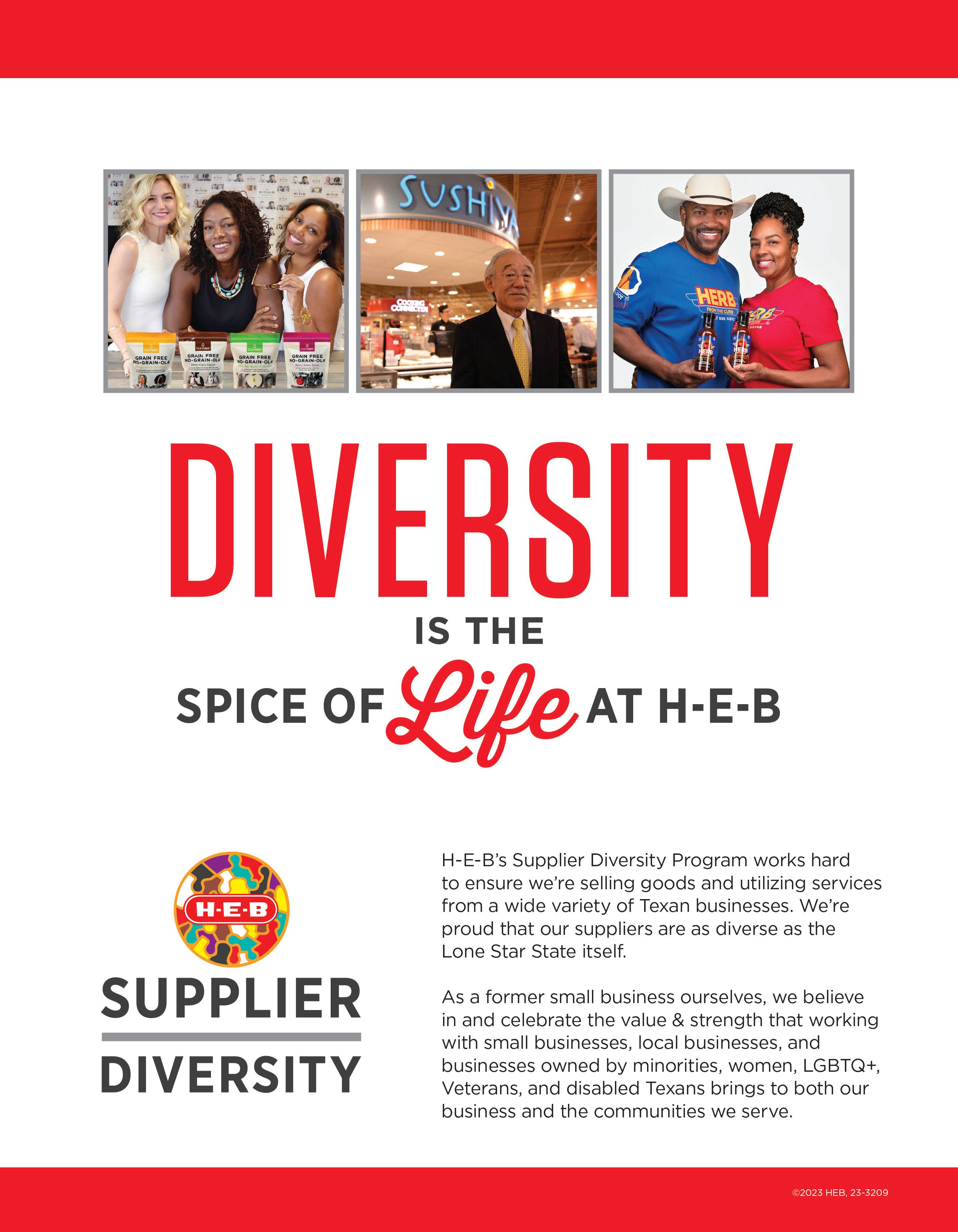










PUBLISHER
EDITOR-IN-CHIEF
Diane Hannah
MANAGING EDITOR
Nancy Gray
FEATURES EDITOR
Taylore Gills
SALES/MARKETING
Diane Hannah
Mel Heintz
GRAPHIC DESIGN
356 Graphix
COVER PHOTOGRAPHY
Steven Arias
CONTRIBUTING WRITERS
Dr. Mateen Diop
Min. R. Joy McGhee
Dr. Dorinda Rolle
Contact us at: info@dashblackbusiness.com
COPYRIGHT © DASH Black Business is published quarterly by CJT Communications. All rights reserved. Cover and contents may not be reproduced in whole or in part without written permission from the publisher.
DISCLAIMER
The views expressed in any story or column in this publication are those of the individual writers and do not necessarily reflect those of the publisher or advertisers.
The products and services offered by individuals within this magazine are not endorsed by the publisher and are included for informational purposes only. DASH will not be held liable for services or products advertised in DASH. The publisher is not responsible for errors in advertising copy.
DASH reserves the right to reject any advertisement and submission for any reason. All product names, brand names, and trademarks may belong to their respective holders.
Printed in the USA
DASH Black Business is committed to providing content that is empowering, insightful, inspiring, and relevant to Black leaders, entrepreneurs, and professionals in various industries. We are also a networking resource for Black business owners.

Dr. Mateen Diop is the founder and CEO of My All Things Educational, LLC. He is a consultant, coach, and author whose wealth of knowledge stems from over 25 years in public education in San Antonio, Texas. He has served at every leadership level in grades K-12. Dr. Diop is passionate about inspiring others to win by believing in themselves, dreaming big, and staying focused. He formerly served as the Project Director for the Knowledge is Power (KIP) Community Learning Centers.
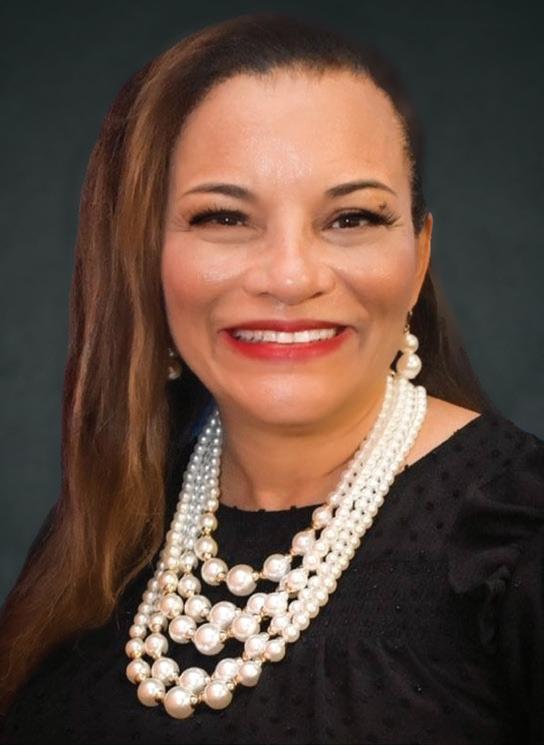
R. Joy McGhee is an enthusiastic motivational speaker and corporate trainer specializing in workplace, leadership, and technology training. She is a John Maxwell Team Certified Member with over 20 years of experience in leadership training and a proven track record for developing leaders in the private and non-profit sectors. Joy is a licensed minister and founder of Inspirationally Yours Corporate Training and Motivational Services. She is also the president of the National Coalition of 100 Black Women, San Antonio Chapter.
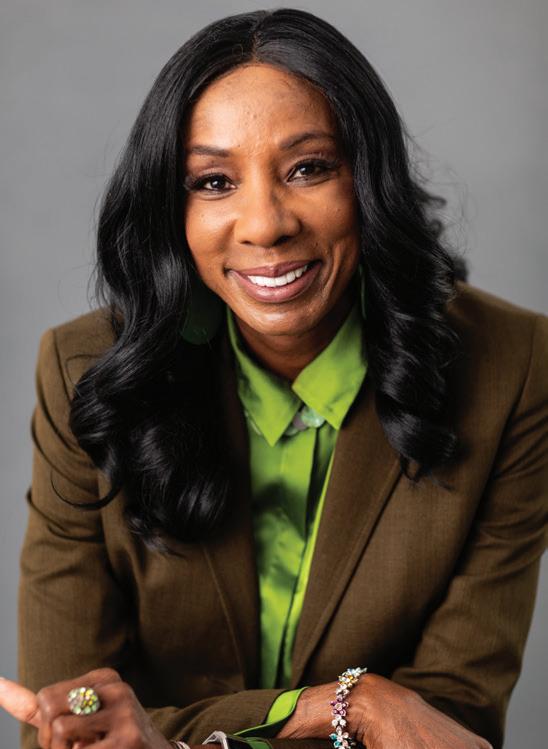
Dr. Dorinda Rolle is the founder and president of Rolle and Associates, LLC. In addition to consulting and training, she is a motivational speaker to corporations, nonprofits, women’s groups, and on college campuses. She has been an adjunct professor in the Industrial/Organizational Psychology program at St. Mary’s University in San Antonio, Texas, and the African American Studies Program at the University of Texas at San Antonio (UTSA). She is also an executive coach, educator, and author.


“What are you doing with your dash?”
Living a life of purpose is about making the most of our dashes, which symbolize the span of time we are granted between birth and death. It’s about consciously choosing how we spend our days, ensuring that every moment is aligned with our true desires and values. Are you living authentically, pursuing your passions, and fulfilling your potential? Or, are you merely going through the motions, living the life others expect of you?
It’s easy to get caught up in societal expectations and the pressures of conforming to a certain lifestyle. However, true fulfillment comes from following your own path, living in alignment with your deepest aspirations, listening to your inner voice, and most importantly, listening to God. You have a unique purpose—a reason for being here— and it’s up to you to discover and fulfill that purpose. Live with intention, do what makes you truly happy, and embrace your passions. This is an invitation to reflect on how you are using your dash to add value and make a lasting impact.
The mission of DASH Black Business is to help you achieve your business goals by providing content that is empowering, insightful, inspiring, and relevant to Black leaders, entrepreneurs, and professionals in various industries. We shed light on individuals who embody the essence of perpetual growth and ambition. Our focus is creating a space for you to engage and network with peers and prospective clients, unlocking new possibilities for expansion and collaboration.
The pages ahead are filled with stories of change agents—our cover feature, Commissioner Tommy Calvert, DreamWeek founder, Shokare Nakpodia, and others who are not only living their dreams but continuously

planning and advancing. You will discover the businesses they’ve initiated, the strides they’re making professionally, and the products or services they offer that enrich lives. Learn from their experiences and gain insight into practical tips and strategies you can implement for your personal and professional development.
I encourage you to patronize Black-owned businesses and to support our ad sponsors who played a crucial role in bringing this magazine to life. Thank you to everyone who contributed—in any way—to the creation of this inaugural issue, helping it transition from concept to reality. Your support is greatly valued.

Diane Hannah Publisher/Editor-in-Chief dhannah@dashblackbusiness.com
Instagram: @msdianehannah
Instagram: @dashblackbusiness

Our history, rich with the profound sacrifices of those who came before us from the shores of Africa to the heart of modern civil rights movements, is a testament to the enduring spirit of the Black community.
Sharing our stories—wins, losses, and lessons learned— is an opportunity to honor the immeasurable legacy of resilience, courage, and unwavering strength passed down through generations. As community builders and change agents, it is necessary for Black men and women to recognize the importance of our continuing role in shaping a future filled with equality, justice, and expanding opportunities.
Our history, rich with the profound sacrifices of those who came before us from the shores of Africa to the heart of modern civil rights movements, is a testament to the enduring spirit of the Black community. It is a heritage we proudly claim as our own, a source of motivation as we continue to build and leave legacies that open doors not only for our community today but for generations to come.
Black business owners, leaders, and community servants have the collective power and responsibility to continue the work started by those who fought for our rights and freedoms—remembering that our actions today are the foundations for tomorrow’s successes. It’s about acknowledging the toil of our predecessors and honoring them by doing our part. Our commitment to opening doors, removing obstacles, and paving new paths is necessary in building equity and ensuring success against all odds. Together, we can create a future where every Black individual, community, business, and institution can thrive, free from systemic barriers.
We stand as architects of change, writing new chapters
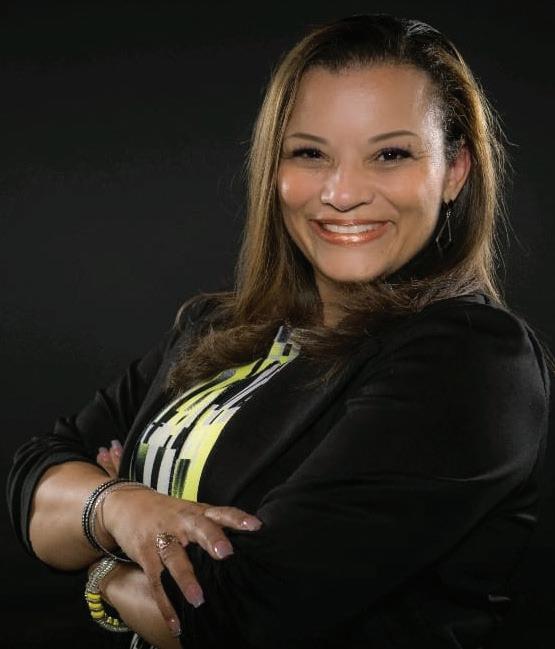
of history with every step we take forward. It is not only our privilege but our edict to uplift each other, break new ground, and forge a legacy of empowerment and achievement. Every role we embody—be it as family members, friends, encouragers, faith walkers, community leaders, breadwinners, health stewards, knowledge disseminators, innovators, policy shapers, or business drivers—etches line after line into the pages of our history, crafting a narrative that inspires others to persevere and extend a helping hand. Our multifaceted contributions weave a rich tapestry that not only celebrates our achievements but also serves as a beacon of hope, encouraging future generations to strive for excellence and support one another in our collective journey towards success and empowerment.

Inspirationally Yours, www.inspirationally-yours.us Instagram: @American1angel
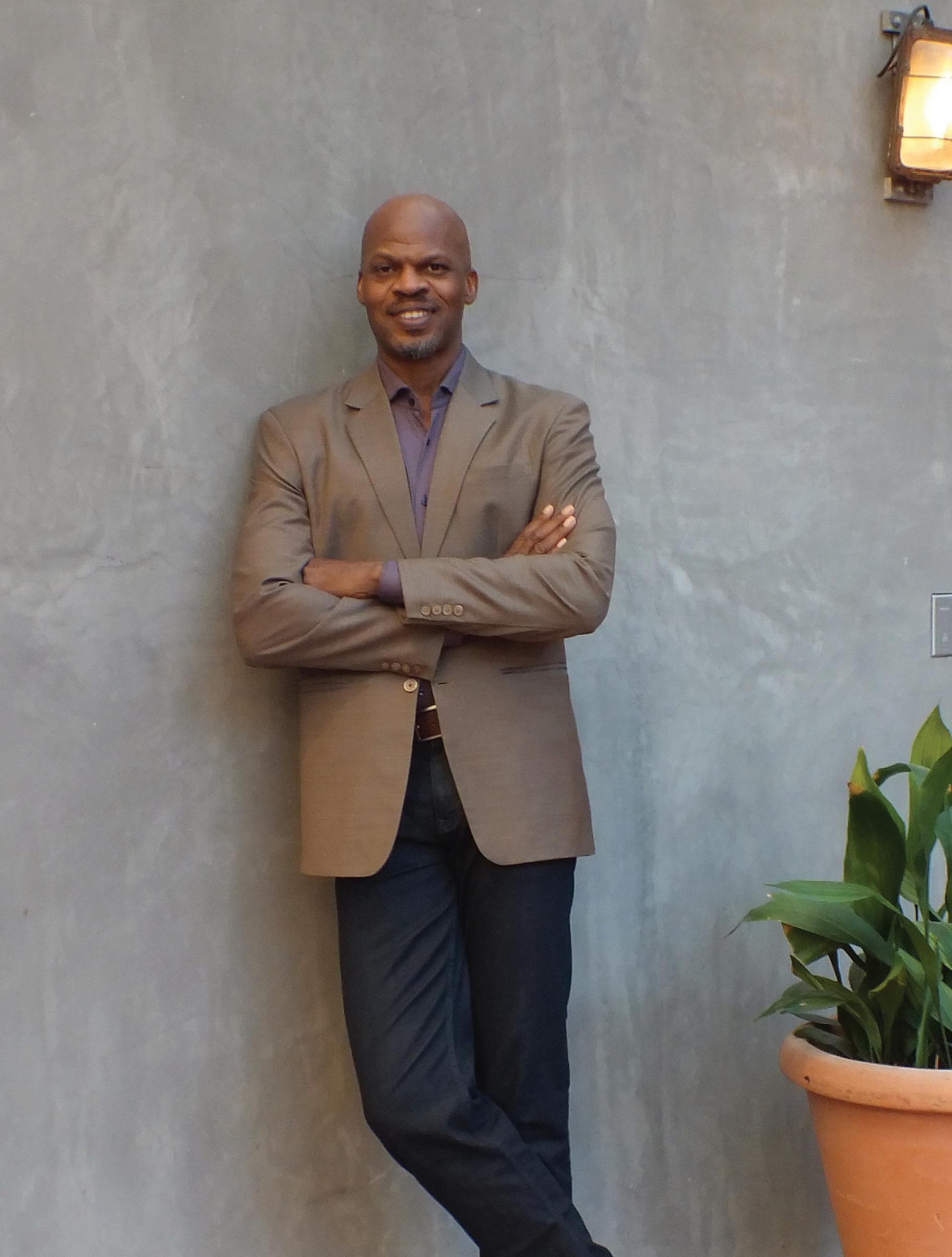
by Taylore Gills
The last thing my father said to me that sustained me for many years was, ‘I’m proud of you...’ My father was like a god to me; I never imagined that he would die. I thought the world would end, and it didn’t. Life just continued. “ ”
Shokare Nakpodia, or “Sho,” as he is affectionately known, sheds light on his Nigerian roots and takes us inside his very own coming to America story. While a child living in Nigeria, he was intrigued by the strength and endurance of Black Americans and would talk to his father about his desire to one day call America home. Born in Lagos, Nigeria, he was the fourth and final child of his parents’ union, which is reflected in his name, Shokare, meaning “complete,” “finished,” “sufficient,” “satisfied.” His last name, Nakpodia, means “this is how the world is.” Eight siblings were born after him. “I was one of twelve children; my father, whose name was Lagos, had several wives at the same time,” he shares.
When Shokare was in his mid-twenties, his father was tragically murdered by gunmen at an intersection in Nigeria while traveling home from work; his killing was politically motivated. Reflecting on his father’s final words to him, he says, “The last thing my father said to me that sustained me for many years was, ‘I’m proud of you.’ That was really a good thing.” He adds, “When he was killed, I kind of lost my way. I went back to where he was buried; I remember going into the bush, into the forest. I just sat down behind a tree somewhere and bawled. They sent a search party looking for me. I don’t think I’ve
cried since then; I think I’ve cried every cry I could cry. My father was like a god to me; I never imagined that he would die. I thought the world would end, and it didn’t. Life just continued.”
Sho recalls living in Lagos, London, and New York, which he describes as “major chaotic places with a lot of noise and action.” When he first came to San Antonio to visit his sister, he fell in love with the city—the Riverwalk and other attractions. “In Lagos, I was a kid, so I kind of had a balance of what life was. I lived a life of privilege in London but arrived in New York poor. San Antonio was like a blank slate for me, so I moved here,” he states.
A visionary, innovator, and creator of opportunities, Nakpodia harbored a dream to unite the San Antonio community in the spirit of Dr. Martin Luther King, Jr. Fueled by belief and passion, he launched DreamWeek to provide platforms for conversations, collaborations, and transformations. The highly anticipated, annual citywide event is the largest community curated summit of its kind in the nation, lasting longer than two weeks with almost 300 events held at 80 to 120 different locations. There are 150 to 170 hosting partners each year, and those numbers continue to increase as DreamWeek “bridges the gap between people and ideas.”
DreamWeek is a very successful community undertaking. What do you attribute that success to? It’s always the team you have. We have a very calm, happy team. When you’re working and interacting with 150 partners, the environment can become stressful, so having the right people on your team is crucial.
When performing your day-to-day responsibilities, which is sometimes hectic, how do you keep a positive mindset? I keep in mind that today is a gift—an overlap of what happened yesterday. And I make sure that I’m more in love with tomorrow than yesterday.
What is the preparation for DreamWeek like? What does it entail?
First, we reach out to potential partners to invite them to host events, and then we have to raise money to promote those events. We also have to look for speakers. There’s always something happening that requires making the right decision. I tell my team members that with things like event planning or whatever, there are always two solutions—one or the other, so don’t waste time.
Has there been a DreamWeek event that left a lasting impression and changed you in some way?
My ideal event was one that the San Antonio Housing Authority (SAHA) had with Frost Bank where they took 50 at-risk students to The Plaza Club for dinner. It struck me that many kids are just looking for appreciation of their worth as people. That outing gave them the opportunity to have a different point of view—literally—looking at the entire city from 20 floors up. They were taken out of their comfort zones and allowed to adventure physically, intellectually, and spiritually.
What is a leadership trait you possess that contributes to the cohesiveness of DreamWeek?
Building relationships. My contribution is realizing that my true talent is bringing people together to create a more substantial whole. I’m against dismissing people. I try to make sure that we understand the divinity in each and every human being. Every time I step out of the door, every single person that I meet, I believe in treating them as if I’m meeting God. When we do that, it will change our lives, and we’ll start to learn more about ourselves, too.
DreamWeek provides a service to the community. What does service mean to you?
When you have something inside of you that you’re passionate about, when you show up and do it—whether that’s music, sports, or something else—you’re providing
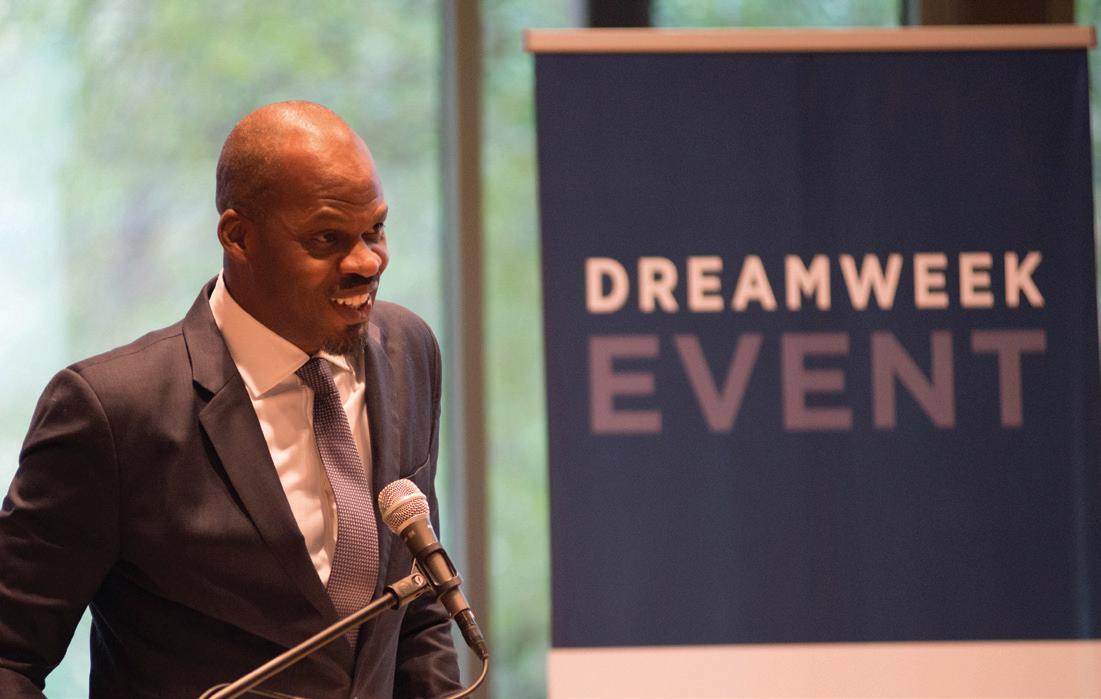
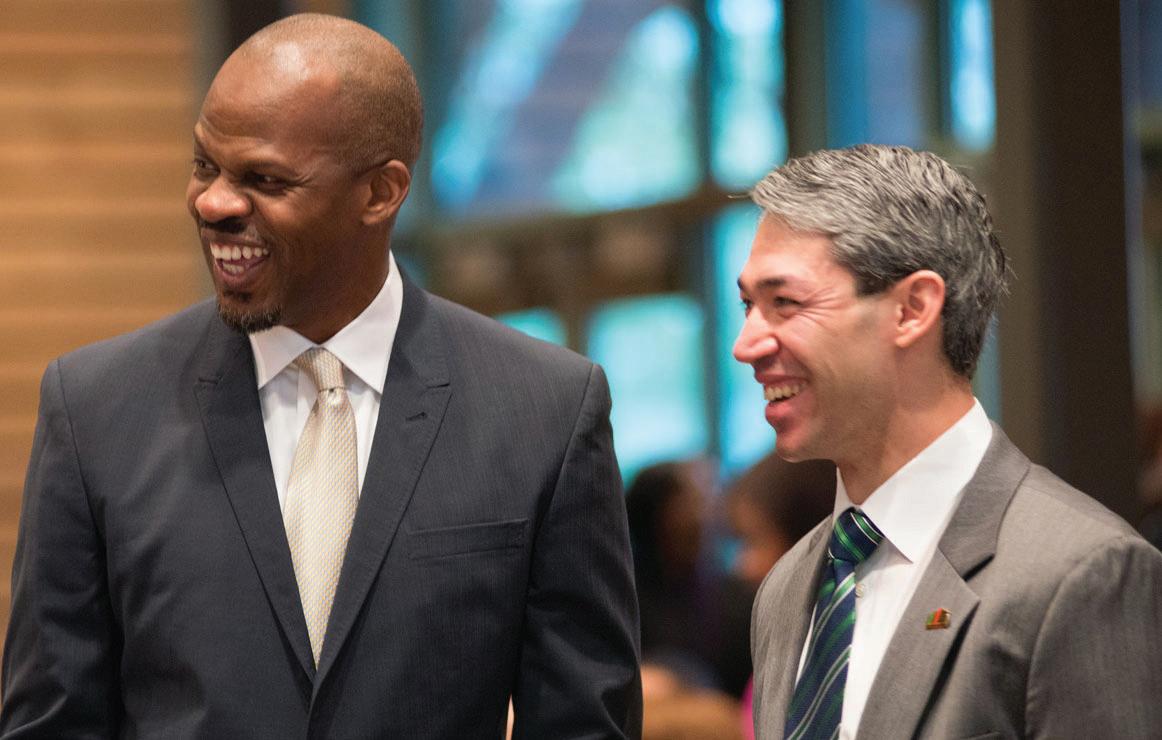


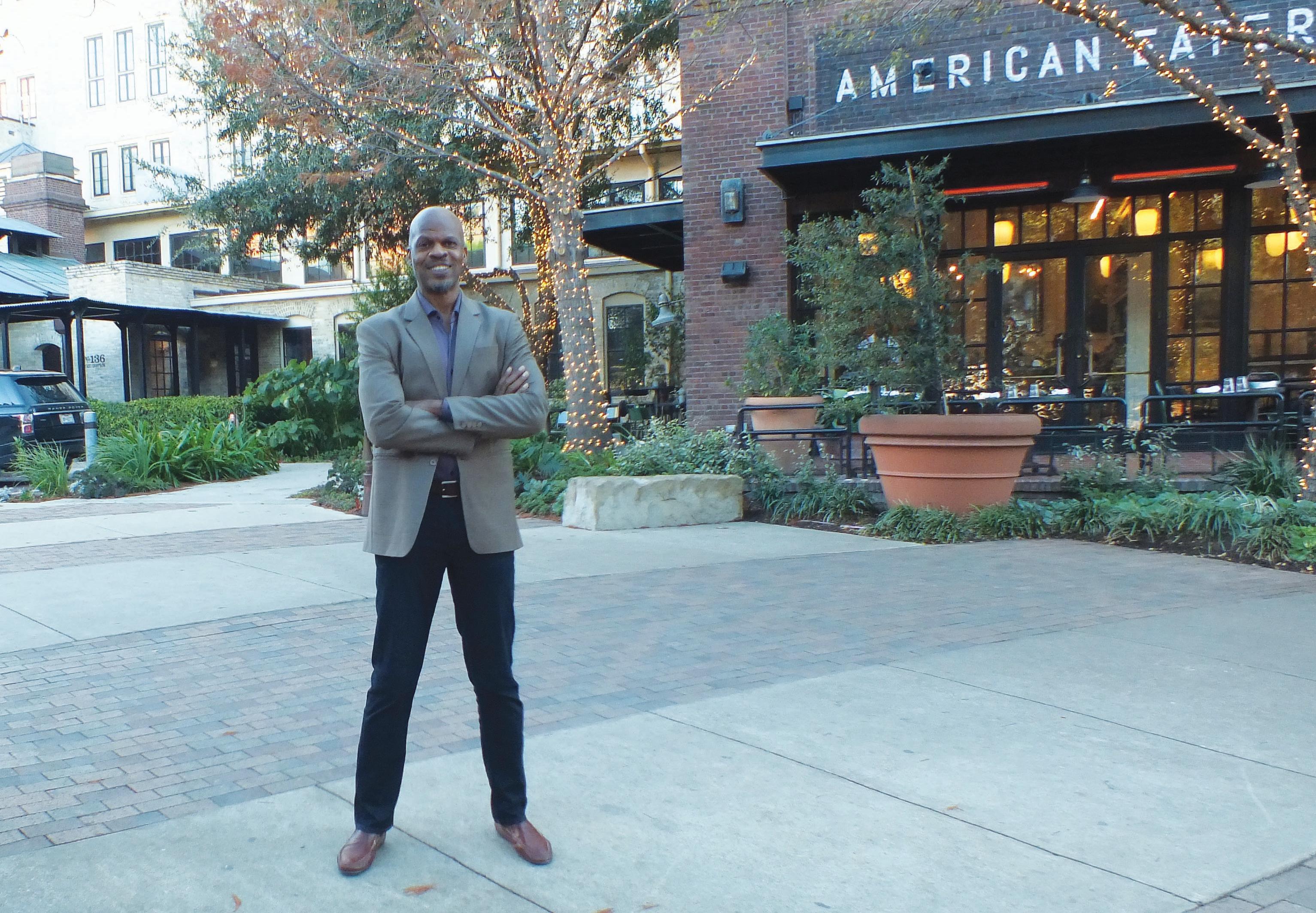
a service. For example, the Spurs players are providing a service of entertainment to the community. If you can find something that you’re really passionate about, something that you’re compelled to share, it’s usually going to be of service to people.
What impact do you want DreamWeek to have on your son and daughter as it relates to being change agents and servant leaders in the world?
It’s important to allow children to blossom and not be defined by whatever role the parents think they should have; I think that’s dangerous. Children come with their own gifts and talents, and as best as we can as parents, I believe we should give them as many opportunities as possible so they can see the different options they have in life. Because of how seductive this world is, it’s very important to let them know that they shouldn’t just be consumers, but they have to produce as well and hopefully leave this world a better place than they found it. I’m making sure that my son and daughter understand that they have something to contribute otherwise they wouldn’t have been born.
To the person struggling to figure out their purpose, what is your advice?
Make sure you’re contributing to the community in some fashion. What can you offer that isn’t already there? As a child of God with genius within, how do you access that genius? That’s what I strive to do. I just ask myself what God created me for and what I can share with everyone else that no one else has. It’s pointless to look outside of yourself because that’s not where the answer exists—it’s inside of you.
What do you want your legacy to be as it relates to DreamWeek?
When I’m no longer alive, I want people to remember that something extraordinary happened in San Antonio. I just happened to tap into it.
How can people become involved in DreamWeek? They can go to DreamWeek.org. We need volunteers, we need people to work as part of the team, we need people to host events—especially people who are talented and have never had a platform. The most passionate people are the people we want to have. When a person has a lot of passion and no where to release it, that is a very painful undertaking.
Instagram: @Dreamweeksa
Be who God created you to be...God made us unique individuals for a reason. He gave us a purpose and a passion.
Crystal Royal radiates an amiable nature that is warm and welcoming, which makes her current role as Supplier Diversity Manager for HEB the perfect fit. Describing herself as a socially awkward introvert, in the right environment, she’s striking up conversations and having stimulating interactions with others. Royal attributes her career success to her unwavering authenticity—staying true to herself, knowing her likes and dislikes, and acknowledging her strengths and weaknesses. “I’m not afraid to admit what I’m not good at or what I don’t know; I’m open to learning. I listen,” says Royal.
Becoming better listeners is the first attribute she emphasizes in her many discussions with business owners. She believes that listening to sound advice and being willing to pivot are key components to avoiding unnecessary bumps and bruises while navigating the unforeseen challenges of entrepreneurship.
The second trait she wants entrepreneurs to embrace is patience. Experience has shown her that a lot of today’s business owners want microwave results—instant gratification. They want to make a profit right now. “Take your time. Instead of focusing on making money right now, think long term,” she advises.
Thirdly, she states the importance of being innovative. Too often we look at what someone else has, and we want the same thing for ourselves. “What we should do,” she suggests, “is tap into our own creativity. You would be surprised what you can come up with by just doing your own thing instead of trying to emulate somebody else.”
When asked about facing challenges in her personal and professional life, she unapologetically states that her faith in God sustains her. Royal shares, “Prayer has gotten me through so much in the deepest, darkest moments of my life. Prayer is at the forefront of my life, and I wouldn’t have it any other way.” While respecting the differing beliefs of her peers, she makes it crys-
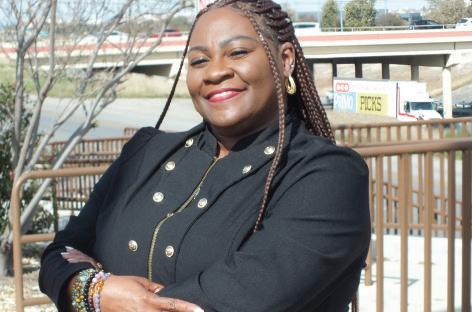
CRYSTAL ROYAL Manager, Supplier Diversity
tal clear that downplaying her faith in the workplace or anywhere is not an option. “Being in corporate America, I respect others. And when I’m in those spaces, I’m still going to be me,” she adds.
Reflecting on her seven years of employment with HEB, she talks about the impact that her mentor, Peter Soltys, has had in her life. “My mentor saw me, and that was incredible to me. He saw me—not who he wanted me to be, but he saw me when I couldn’t even see myself. He saw things in me that I didn’t even know I could develop, and he’s still doing it to this day. He’s still reaching out to me; he’s still asking me how I’m doing. He’s an incredible mentor. My other mentor is our group Vice-President of Public Affairs, Winell Herron. She is the epitome of a Black woman who is classy, beautiful, and soft spoken, yet still true to who she is.”
Royal adheres to a familiar quote spoken by former First Lady Michelle Obama: “When they go low, we go high.” She explains that she’s always lived that way: “You may double punch me, but I’m still going to smile at you because there’s a love that God gives me unconditionally every day. I get the gift of unconditional love every day, so I don’t mind giving it to someone else.”
Additional advice she has for entrepreneurs and corporate professionals is not to get so caught up in the world: “Be creatively, individually, and uniquely yourself. Be who God created you to be. So many of us are out here thinking we need to change something about ourselves, or we’re looking outside of who we are. But God made us unique individuals for a reason. He gave us a purpose and a passion. So, don’t look within the world; look within yourself.”
I make it a point to educate individuals and help them make the best choices for themselves and their families.
”
Dominique Miles launched her State Farm Agency on February 1, 2019. Prior to opening her business, she held positions at JPMorgan Chase working as a Relationship Banker for two years and later as a Branch Manager for 16 years. In her transition from banking to owning her agency, she discovered a fervor for enlightening clients about financial matters and insurance products.
Dominique believes education plays a pivotal role in making sound decisions. When asked about the importance of insurance policies for individuals, she emphasized the significant impact insurance can have on people’s lives: “Leaving a loved one is hard enough, but to lose a loved one without insurance is a game-changer. I make it a point to educate individuals and help them make the best choices for themselves and their families.”
During her five years in insurance, she has learned that a considerable number of Black individuals do not have life insurance coverage. For this reason, she makes it a priority to participate in community events to raise awareness of the benefits of life insurance. Sharing her perspective, she states, “Our community gets so caught up in ourselves that we don’t want to look out for one another. We also don’t focus on generational wealth as we should. Many of us, for example, may inherit land, and then we sell it instead of working collectively with one another to make that income become long term wealth.”
A particular mindset prevails that keeps many Black people from seeing the value in possessing life insurance. This is in part because of the lack of education. According to Miles, “We ignore health issues, and we have many poor health habits as a result of the scraps our ancestors were given while enslaved. We need more doctors that look like us in our neighborhoods to provide health education.”
Explaining the basic forms of life insurance, she pro-

vides the following insight: Term life insurance is life insurance you rent for a specific time. You use this while your children are in the home. You rent group life from your employer as long as you work there. Term can be used as long as you own a home or a car. If you have a home mortgage for 30 years, you buy term for those 30 years. Whole life is insurance that you own. It stays with you until age 120, and you pay for it until age 99. It’s more expensive than term, and whole life may pay a dividend, which you can buy more life insurance with, pay down your monthly premium, or take a loan for future financial needs.
For individuals interested in purchasing life insurance, Miles advises doing your research to make sure you are buying from a reputable company with the financial strength to support your loved ones in their time of need. It is also imperative to review your life insurance policies as your life evolves and changes occur. You may not need as much, or you may need more.
To those in leadership positions, she recommends, “Never ask your team to do something you cannot do yourself; I always show coach. Trust your team members. I trust, but I verify. If possible, make the work environment fun.” She also stresses the importance of having a mentor: “My mother is my business mentor. She taught me to always take care of my team.”
If you are interested in launching a business, her words of inspiration are: “Where there is a will, there is a way. When you put your mind to something, you can do anything! Always weigh the pros and cons. If the pros outweigh the cons, then go for it!”
by Dorinda Rolle, PhD
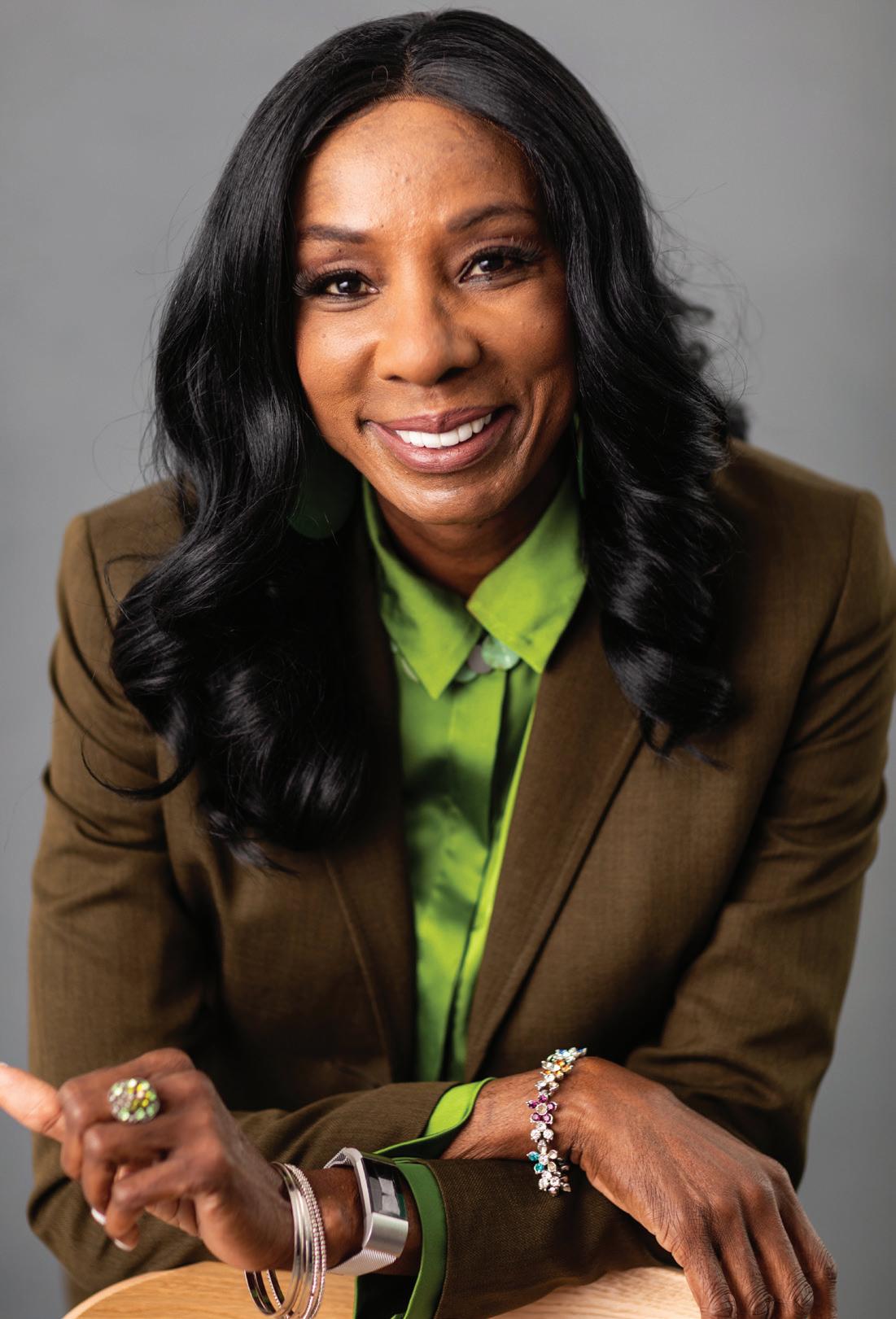
A new kind of leader is emerging. Traditional leadership traits of integrity, charisma, intelligence, and determination will always be needed and desired, but they are not enough for the challenges faced by leaders today. A new kind of leader is one who is not afraid to buck some of the old ways in favor of embracing a leadership style that gets results and respects followers; and more importantly, models behaviors and attitudes for the next generation of leaders who are watching.
The five traits of a new kind of leader in this article are not exhaustive; there are many others. Emotional intel-
ligence, expert knowledge, self-confidence, agility, and sociability are starting places for leaders who want to experience a breakthrough in their leadership style. A new kind of leader sparks and inspires real and lasting change because they continually evolve themselves.
1. Emotional intelligence is the ability to understand, perceive, and interpret the emotions of others with the proper response. It is also the ability to express and control one’s own emotions. The new kind of leader identifies with followers and has a keen sense of self-awareness. The traditional leader believes they are different from their followers and may unknowingly project a position of aloofness or detachment. They hang on to the old notion that familiarity breeds contempt, never allowing transparency or vulnerability. A new kind of leader allows transparency and is able to respond appropriately to their followers’ emotions about them being human.
2. Expert knowledge. A leader is not expected to know how to operate every piece of machinery in a plant or even how to manipulate the latest social media; however, the new kind of leader is an expert in the issue they are leading because they are setting the trends in that given arena. If one fancies him or herself to be a leader in civil rights but has little knowledge of civil rights history, chances are, they are not a new kind of leader. If one wants to be a leader of something they feel called to do or are passionate about, they should study that subject. They should learn all they can about the topic, create new knowledge for others to digest about the topic, and create a vision for others to get excited about. By doing so, they establish themselves as experts or the go-to person on that topic.
3. Self-confidence is one’s belief or certainty in their ability or decisions and is the result of competencies, skills, or knowledge of a given topic. Seldom do you hear a trained athlete say, “I think I can do it.” They typically
speak in the affirmative, “Yes, I can do it,” because they know the sport well and have trained over and over again. That’s what gives them self-confidence. A new kind of leader trains for his or her role to get to a place of self-confidence and trains to stay in a position of leadership. Gone are the days when organizations and movements maintain the same leaders decade after decade. Leaders must remain relevant. There is a correlation between relevancy and self-confidence.
4. Agility is moving quickly with ease and the ability to think on one’s feet. Some have described agility as intellectual sharpness, but it is more than that. The new kind of leader embraces change and even creates change. A new kind of leader respects the past and the contributions of those who have paved the way and opened doors for them, but they are not tied to the past. The agile leader has learned how to navigate in and out of certain systems and audiences. For example, civil rights leaders in the past have used marches and boycotts to gain attention and results. An agile leader might use those methods but also use social media such as Twitter, Instagram, and Facebook or may develop
an app for smart phones and iPads to further their mission. The agile leader is comfortable working and engaging with a variety of constituents, colleagues, and customers. The new kind of leader is not married to a process but will quickly adjust when things are not working or producing desired results.
5. Sociability, as it relates to the new kind of leader, is closely identified with charisma and emotional intelligence. Sociability is demonstrated with good interpersonal communication skills. Leaders who rank high in sociability are able to show empathy for others and often put the needs of others above their own. They seek positive social relationships that often lead to collaborations with other individuals and organizations. They gladly assist others with their visions and work without fear that helping others will diminish their vision or work. They understand the law of reciprocity and give freely to others, believing that whatever they put in the atmosphere will come back.
Dr. Dorinda Rolle is Founder and President of Rolle and Associates, LLC. For more info: www.dorindarolle.com.

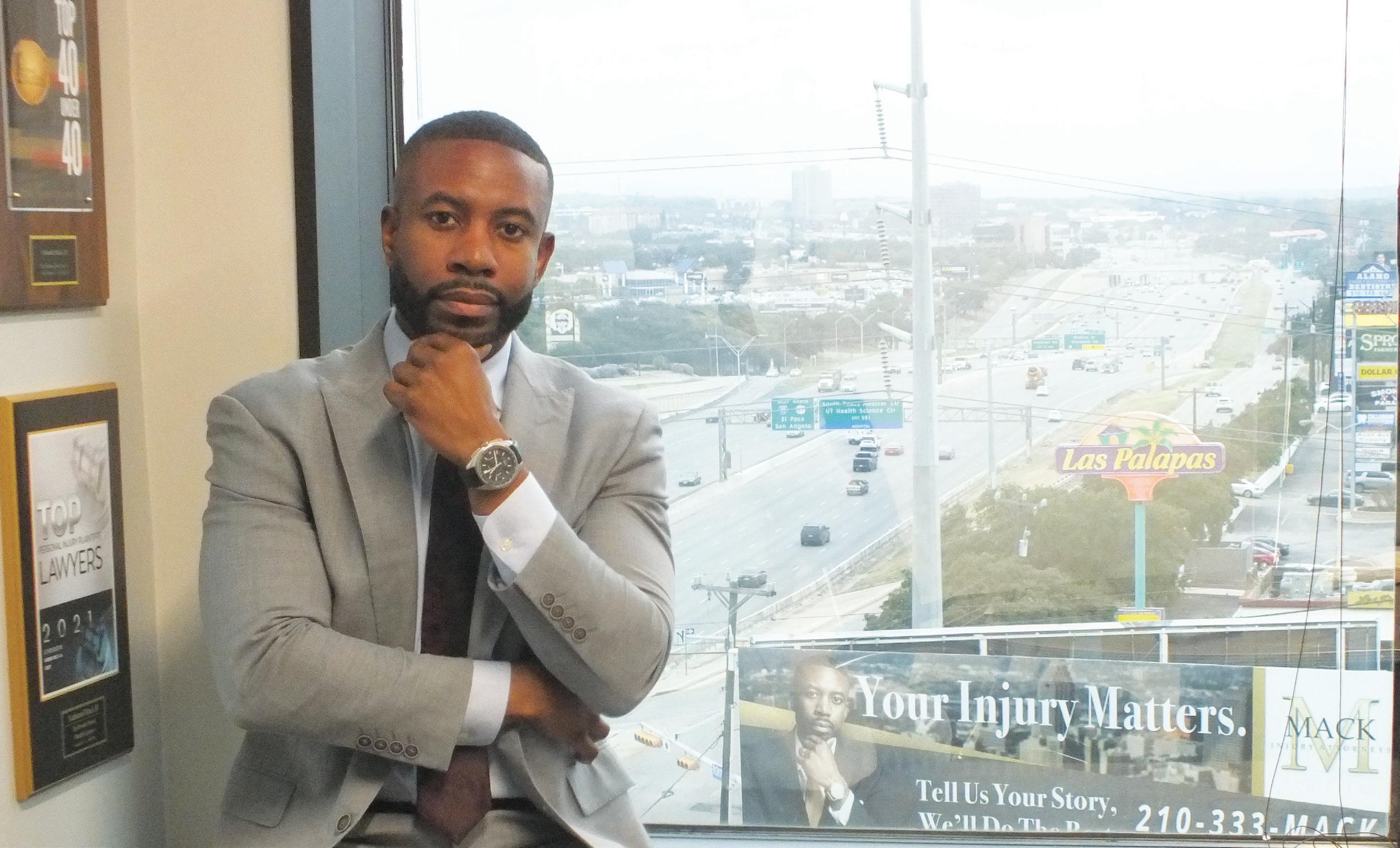
NATHANIEL MACK
Founder, Mack Injury Attorneys www.333.mack.com
Nathaniel Mack began his law career in Corpus Christi, Texas, working for the Thomas J. Henry Law Firm. Reflecting on his time spent with the firm, he states, “I had great mentorship while there. It wasn’t as big as it is now, but that’s what led me on this personal injury path.” Mack left Corpus after three years to work in the Thomas J. Henry San Antonio office. After about a year, he left there to work for a different law firm until deciding to take the leap of faith and launch out into the deep. “Being around those lawyers and learning the business side as well as the legal side gave me the confidence I needed to branch out on my own. I have an entrepreneurial spirit like my father,” says Mack.
What areas of law do you practice?
Personal injury is one thing I do, but I also do mass tort and environmental toxic tort along with civil rights law. I’m also in the sports and entertainment sector of law—mainly the boxing space. I represent a couple of promotion companies, and I manage a few boxers and a few college football players. I’m looking to grow that aspect of my business.
What inspired you to become a lawyer?
My mother planted the seed when I was young. She told me that she could see me being a lawyer one day, so I would go around saying I wanted to become a lawyer; and it stuck with me.
What was being an entrepreneur like in the beginning?
I was hustling; I was broke, but God made a way. I did a lot of networking and just being in the right place at the right time led me to where I am today.
What kept you going during those tough times?
A lot of persistence, determination, drive, and ambition. Knowing what I wanted and telling myself that nothing was going to stop me. I had the discipline to weather the storms and not give up when things got really tough. When you’re frustrated and feeling like it’s not going to work out, you have to fight through those down times mentally and emotionally.
How did you remain disciplined while going through the process to become an attorney?
I was constantly mindful of my purpose, and I was pretty much laser-focused. I had the discipline to not go out and party all the time but to save the little money I had. Friday and Saturday nights, I was brainstorming to figure out what my next goal was and how I was going to make it happen.
Impacting their lives in their biggest time of need...and seeing the look on their faces when we’re able to help them is priceless. “ ”
You mentioned that your mother “planted the seed.” In what ways did she support you while you were building your career?
My mom helped me stay focused; she instilled a lot of confidence in me. Whenever I have problems, troubles, I’m talking to mom. Even to this day, I’m calling mom. Just hearing her voice—she always has something wise to say to level me out and keep me grounded. Having my mom is everything because I depend on her on a daily basis for understanding and for sanity, if you will. Regardless of what’s going on, she always seems to be able to just kind of calm things, and I really appreciate that about her.
What is one skill you implemented that was crucial to the growth of your business?
Networking was really important. They say “your network is your net worth.” When you’re trying to start a business from scratch, you have to know people; you can’t do it by yourself. You have to have folks in your circle that can help connect the dots. I was putting myself out there, meeting people, shaking hands, attending conferences, and other events. And that networking allowed me to slowly grow and build.
How do you manage your professional life and your personal life?
I do my best to compartmentalize—flip a switch. Work is work. When I’m with my wife and kids, I’m in a completely different mindset. I try my best to focus on where I am at the moment.
What’s the most fulfilling aspect of your work?
There are so many dynamics that come along with what we do. We represent families who have lost loved ones in catastrophic events. Impacting their lives in their biggest time of need, being able to let them know we care and that we’re there for them, and seeing the look on their faces when we’re able to help them is priceless.
What would you tell someone who is just getting started as an entrepreneur?
I believe in affirmations and writing things down. If you have a goal—a plan for your life—you need to write it down on a piece of paper; don’t type it out on the computer. Get a pen or pencil, write it down, and look at it. I think that puts positive energy out there in the world. Also, subconsciously, it gets you focused on what it is you’re attempting to do. You need your thoughts organized if you want to get to a certain goal in your life because there are so many distractions, so
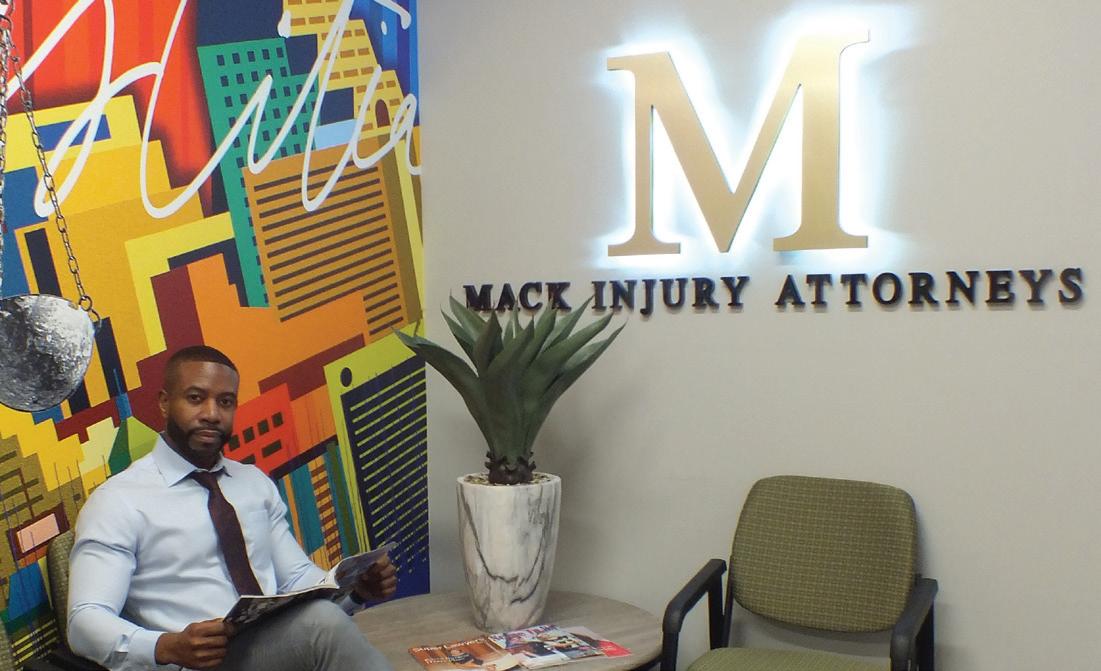
many things that come up that can derail you from your path—even small distractions. Having a plan and writing it out helps guide you through all the obstacles and helps you avoid the things that will get you off course.
What guiding principle do you follow in life?
“Carpe diem,” meaning “seize the day.” Each day we wake up is a blessing. We’re able to bless another person in some way, even by doing small things—just smiling at someone and saying “hello,” or opening the door for someone. We can seize the day by continuing to push ourselves towards whatever goals we have in life. We should make the most out of each day because we’re not promised tomorrow, and you just never know what’s going to happen in life. We should wake up and take advantage of the time we have here by making something out of each of our days.
What words of inspiration do you have for business owners facing challenges?
You’re going to have storms; it’s not going to be an easy path. When each storm passes, you’re going to be stronger, better, and you’re going to be even more focused. Keep pressing ahead full steam. Patience is very important. Growth doesn’t happen overnight; success takes time, so don’t get frustrated. Stay positive and keep the faith.

by Taylore Gills
Commissioner Tommy Calvert stands as a dynamic and influential figure in San Antonio’s political arena. Breaking barriers as the first and youngest African American County Commissioner in Bexar County, Calvert demonstrates unwavering commitment to the diverse communities within Precinct 4, where he has been overseeing the well-being of over 500,000 residents since his election in 2014. Precinct 4 has found a devoted advocate in Calvert.
Tommy Calvert was raised on San Antonio’s southeast side just a block off Martin Luther King Dr., in Eastwood Village. Describing his early childhood as one with “amazing memories” that included watching cartoons like G.I. Joe and the Transformers, Calvert chuckles as he reminisces about being called boring by his cousins for wanting to watch CNN like his dad. His face brightens with a beaming smile as he speaks about being pushed in an HEB shopping cart in San Antonio’s Martin Luther King marches, having fun chasing fireflies along the banks of Salado Creek, and having the “blessing of two great parents.”
Despite their divorce when he was four, Calvert was fortunate to maintain a close relationship with both his mother and father. About his father, Tommy “TC” Calvert, Sr., and his mother, Dr. Valerie “Val” Calvert, he expresses, “I think I hit the jackpot when it came to my parents. I had great activist training from my dad; I call it the ‘Jedi Training of Activism.’ Then I had my mother, who was a corporate leader at IBM. She polished me, if you will, so I had both sides growing up. My family’s support has been critical because when you’re doing the kinds of things I’m doing, where you’re really sacrificing yourself in service to others, you need support. I benefit not only from my family, but my community has been really amazing as well.”
Having attended private schools in San Antonio— Central Christian, MacArthur Park Lutheran, St. Luke’s
Episcopal, and St. Mary’s Hall—from 6th to 12th grade, Commissioner Calvert is grateful for the tremendous sacrifices his mother made to ensure he received a quality education, stating, “I attended some of the most expensive schools in town, and I received some scholarships, thank God, because we couldn’t have afforded it without them.”
Tommy grew up attending numerous neighborhood association meetings with his father, who organized about 30 of them—not only on the East Side but throughout the city. Under his father’s tutelage, he gained invaluable insight and wisdom about the ins and outs of community service and activism which was instrumental in his development as a public servant. “My dad gave me movement building. I think he is one of the top three living Saul Alinsky organizers. He has that passion for empowering people to petition their government to get things done for them. For example, we had areas that flooded because they had not been given the infrastructure to prevent it. Almost all the streets on the East Side, my father can go down and say he worked to get things done. He worked to get banks to invest in small business people and lend for home loans when they had redlined historically, and I was part of that,” says the San Antonio native.
Calvert explains that running for county commissioner was not in his plans, but God was way ahead of him. He considers growing up in Precinct 4 an incredible blessing for many reasons. Becoming actively involved in the community with his father at a young age sparked his passion for advocacy and activism. This resulted in him establishing genuine relationships with people and engaging in community-centered service, which ultimately helped him gain the trust of those who would later vote him into office as the first African American
The success I’ve had in getting a lot of things done is because I’ve listened and followed through on the things people informed me about. I’m trying to do politics a different way, which I think is the right way—with a servant’s heart. “ ”
County Commissioner of the precinct he was raised in. “Growing up in Precinct 4,” he states, “was an incredible blessing for many reasons.”
Calvert advocates for elected officials to engage in community service, believing it helps them understand people’s experiences and better address their needs. So, it comes as no surprise that after being elected, he kept his promise to remain involved with the community by returning to doorsteps to discuss the concerns and issues of his constituents. Enabling them to participate in the decision-making process is one of his top priorities. When speaking about his leadership style, he explains, “I listen. The success I’ve had in getting a lot of things done is because I’ve listened and followed through on the things people informed me about. I’m trying to do politics a different way, which I think is the right way— with a servant’s heart. And I’m not the only one, there are a lot of good politicians in office.”
His top three mentors in the political arena—his father, Grace Rose Gonzales, and Mario Salas—all exemplify the servant leadership model he embodies. Tommy Calvert wholeheartedly believes in “sacrifice and service.”
According to the commissioner, “It’s important to meet people where they are. That’s the Jesus principle—to meet people where they are, not where you are.”
Commissioner Calvert’s service goes beyond conventional norms, challenging corruption and advocating for the inclusion of minorities in county contracting. He is dedicated to making San Antonio more fair and equitable, dismantling the racism and corruption that have affected the city’s demographics and business landscape.
Regarding Blacks in San Antonio, he shares, “The Black population in San Antonio used to be around 16%, but they were pushed away and terrorized out of town. They were denied job opportunities here, so they went to Houston, Dallas, and other cities where they felt they could get a fair shot. I fight that because I want us to be entrepreneurial. I want us to be a place where small business people can succeed. I had the city of Los Angeles in my small business before I ever had the city of San Antonio or Bexar County. And I had the Department of Health and Human Services in Washington, D.C. as a client before I ever had business in San Antonio. I’ve been working in this office to try to level the playing field.”
Acknowledging that God is the only reason he’s still standing, Calvert notes, “I have fought white supremacy in Bexar County and throughout Texas—cronyism and corruption. People don’t really know what I’ve gone through and endured to stand against those things. I’ve been through a lot—what most elected officials don’t have to go through. When you’re the first of anything, you’re going to be put through some stuff; but the pressure actually elevated my spirituality and my commitment. It’s all working for my good, and I have a closer relationship with God because of it.”
When questioned about his role as a trusted voice for the community, Commissioner Calvert expresses a sense of fulfillment and gratitude, mentioning that he strives to
My hope is that all of us will work on our visions and make meaningful contributions to society.
”
maintain a balanced perspective because he realizes that those who praise today, may condemn tomorrow. “Those who cry Hosanna, Hosanna, will cry crucify, crucify,” he says. Although it’s nice to be encouraged by those he serves, he admits, “I’m much more concerned about having the Man upstairs happy and pleased with my service.”
Commissioner Tommy Calvert is optimistic about the future: “We are heading into a better world; we absolutely are getting better. Groceries may be high, people are still being disrespected, incidents of police brutality are still happening; but we are getting better. My hope is that all of us—not just Al Sharpton, Ben Crump, and Tommy Calvert—will work on our visions and make meaningful contributions to society. We all have a responsibility to work on our goals and impact our communities. Yes, I’m going to lead, but all of us have a responsibility to be actively engaged in our government. We are definitely heading into some of our best days.”
Guided by a servant’s heart, Calvert’s future is on a trajectory toward continued success. He’s stopped trying to plot out his life because experience has taught him that God’s plan is much greater than his. Never anticipating that he would eventually start a radio station and become the general manager, he accomplished both nonetheless. “What I’ve learned is that whatever plan God has for me when it comes to helping people—whether it’s in the non-profit sector, foundational
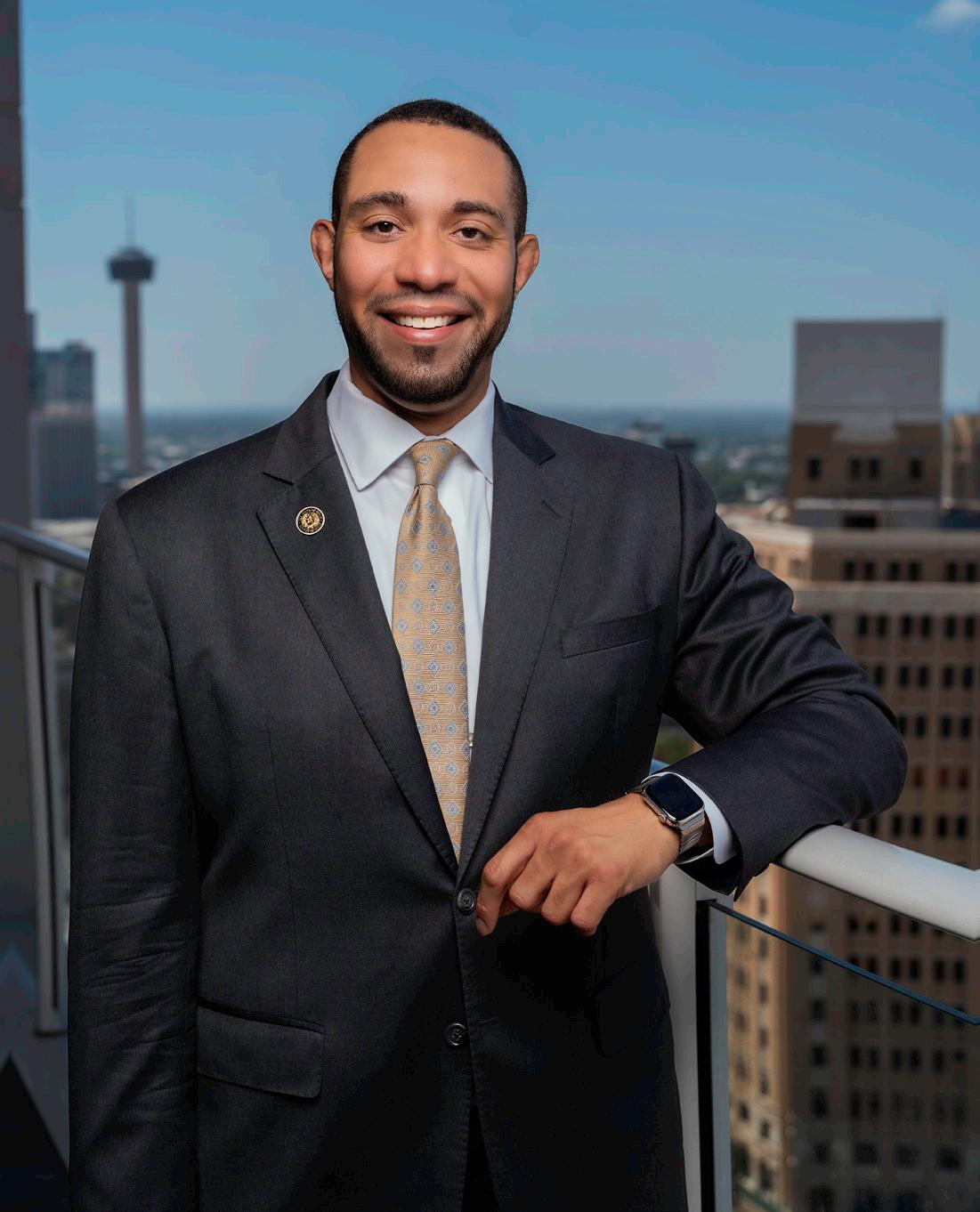
work or in public office—is better than mine,” he reveals. Regarding his past career moves, he’s always gone where he was most needed. He emphasizes that being a leader isn’t about the position or the power, it’s about service to mankind. Uncertain about what the future has in store, according to the Precinct 4 County Commissioner, “I will pray on it, and it will be revealed.”
Peeking into the future, Calvert envisions establishing a leadership institute. Recognizing his need for support, he’s currently having discussions about the endeavor with other elected officials. He states, “I can’t do this alone. I’ve got to have other foot soldiers in elected office to help.”
Commissioner Calvert’s legacy as a trailblazer and force for positive change in Bexar County has been firmly established. Sharing his final thoughts during our interview, he says of himself, “I’m a change agent, and my biggest contribution will be that I will have changed Bexar County in very profound ways.”
For more information about Commissioner Tommy Calvert, visit: TommyCalvert.com
Follow on Facebook at: Tommy Calvert

RENEE WATSON Director, Small Business and Entrepreneurship Department of Bexar County
Renee Watson is a dynamic leader who epitomizes the essence of business acumen with a fervent dedication to empowering small, minority, and women-owned enterprises. With a sharp, strategic vision and a deep understanding of market dynamics, she uses her expertise to navigate the intricacies of the business world. As Director of the Small Business and Entrepreneurship Department of Bexar County, her primary focus is growing the monies that business owners receive from Bexar County—enhancing their financial benefits. An advocate for business owners, she works to create opportunities and provide resources for growth and success.
Watson’s leadership style is marked by integrity, ethics, courage, and a genuine commitment to making a meaningful impact by utilizing her diverse skills to create a more inclusive and thriving business community. According to Watson, to function effectively in leadership one must: 1. Listen to hear, not to respond. She shares, “In public service, your children, in life in general—listen to what the person is saying but not for preparing your response. You don’t hear them if you’re not listening to them. And that is a hard thing to do sometimes because although you know your position on the issue, you’ve still got to listen and hear the other person out.” 2. Respond and respect another individual’s opinion. “Be disagreeable without being negative and intimidating,” she explains. 3. Have faith and trust that this is not about you. “God’s got a plan that you know nothing about.” She continues, “Have faith and trust
In order to have a movement, you’ve got to have people in place to carry on the legacy...You have to leave people in place who are going to continue doing the work. “ ”
that everything is going to work out. Trust God’s plan.”
Stressing the importance of being ready for unexpected opportunities—as she always was—Renee notes that she seldom applied for jobs, but rather responded to calls for service. An example of this occurred when she went on vacation in San Diego and ended up staying for five years working for a city council member despite initially having no connections in the community. Her advice to business owners is to “do research.” She suggests, “If someone is doing something that you want to do, go study them because that’s how you’re going to do better.”
Growing up, there were four community leaders whom she admired and considered mentors: Rick Green, TC Calvert, John Sanders, and Mario Salas. Seeking to glean insights from their experiences, Watson was intentional about spending time with them. Green kept her updated on community meeting schedules, and she attended whenever she could. “Sometimes I took the bus to show up where they were for community organization meetings, and that’s how I was able to learn the public service process,” recalls Watson.
Reflecting on almost 24 years of service with Bexar County, she says, “When I am no longer serving in this role, I want to know that I put people in place to continue the mission, because it’s not just me that makes a difference. In order to have a movement, you’ve got to have people in place to carry on the legacy. I learned that from going through the trainings of Ann Richards and Barbara Jordan back in the early ‘80s. You have to leave people in place who are going to continue doing the work.”
Regarding both her personal life and professional journey, Watson emphasizes that it is unequivocally her faith that has been her pillar of strength.

ONWUACHI, EdD. Former Principal, San Antonio Preparatory Academy
Dr. Shwanda Onwuachi’s self-confidence speaks volumes of her faith, inner strength, and self-love. Proud of her heritage, she shares, “I’ve always been proudly Nigerian and proudly Jamaican. It’s just in me.” The former SA Prep principal embodies a seamless mix of her father’s compassion and her mother’s tenacity. Poised in the face of challenges, she handles every situation with unwavering calm and wisdom that inspires those around her.
Onwuachi stands firm on Romans 8:37; she is more than a conqueror through Him. As a Christian principal, her leadership was guided by her faith with a tapestry of grace and integrity that uplifted the students she led. “I’m unapologetically a Christian, and I always tell people, I’m not a leader; I’m a Christian leader. Wherever I am, Christ is always with me. This is who I am, like it or not. As Christian leaders, I think we have an obligation to really be light. And that’s even when hard conversations have to be had,” says Onwuachi. Her first leadership role was in the army as a postal inspector tasked with ensuring regulatory compliance. Transitioning from the military, she embarked on a career in corporate America, taking on the role of a corporate trainer until becoming a stay-at-home mom. Her journey into the field of education began when her daughter, Chukwuamaka, was diagnosed with autism, prompting Onwuachi to homeschool her from kindergarten to seventh grade. She dedicated herself to researching autism and employed every possible means to support her child. Shwanda takes pride in
I’m unapologetically a Christian, and I always tell people, I’m not a leader; I’m a Christian leader. Wherever I am, Christ is always with me. “ ”
her daughter’s triumph over the challenges posed by autism. “My baby defeated every odd!” she exclaimed. Recognizing her success while teaching her daughter, she began to contemplate the impact she could have on other students’ lives.
Prior to assuming her role as principal of SA Prep, Dr. Onwuachi was a classroom teacher and an assistant principal. Her success in each of those positions can be attributed to her organizational leadership skills. “You have to have organizational systems because with consistency, you’re able to see what does and what doesn’t work. Then you’re able to continue using methods that work. But if you’re unorganized and all over the place, you can’t identify what’s effective. I believe in strong systems,” she states.
In addition to strong systems, patience, empathy, and compassion are leadership traits that enhanced Dr. Onwuachi’s interactions with her students. She explains that each of these elements were vital because students face numerous challenges before even arriving to school. “I was patient, empathetic, and compassionate because we have to code switch so much in spaces; we deal with a lot as leaders, and so do students.” Always eager to support her students, she always held them accountable for their responsibilities. Onwuachi believes it is the duty of parents and educators to make sure our children are solely focused on improving themselves educationally, mentally and spiritually.
When asked what she would tell her younger self, she responds, “Slow down. I always felt like I had to accomplish, accomplish, accomplish, because so many in my family had accomplished so much. And I felt like I had to do it quicker, so I was always trying to accomplish faster and make sure I had all of these accolades. I would make sure I knew that it was okay to slow down.”

by Mateen. A. Diop, PhD
In June of 2022, United States Congressman Henry Cuellar (28th District), along with State Representative Barbara Hawkins (Texas 120), and Presiding Elder Dr. Raymond Bryant (San Antonio District of the African Methodist Episcopal Church), announced new federal funding of $2.3 million, which provided tutoring, access to laptops, and other supplies to low-income students in San Antonio. This initiative aimed to bridge the educational gap by offering after-school tutoring services to neighborhood middle and high school students. The novelty of this funding was that it included the faith-based community in the education of our neighborhood students. As the Project Director of the Knowledge is Power (KIP) program, I was honored and excited to be a part of such a transformative endeavor. With my background in education and a deep belief in the power of tutoring, I was committed to making a lasting impact in the lives of the students.
Throughout my career in education, I have witnessed numerous initiatives come and go. Many failed to make a lasting difference, often due to the lack of sustained funding or community involvement. I realized there was a missing component in our education system—the involvement of faith-based organizations. This realization stayed with me, and when the opportunity to lead the KIP program presented itself, I knew it was the answer we had been seeking.
As the Project Director of KIP, my primary responsibility was to ensure the smooth operation of the program on a day-to-day basis. This involved crafting a clear mission statement and sharing how KIP came into existence. Contrary to popular belief, the funding for KIP was not simply a check written by the congressman. We had to go through an extensive application process with the US Department of Education, which took nearly a year to complete. During this time, I spent countless nights with a dedicated team brainstorming
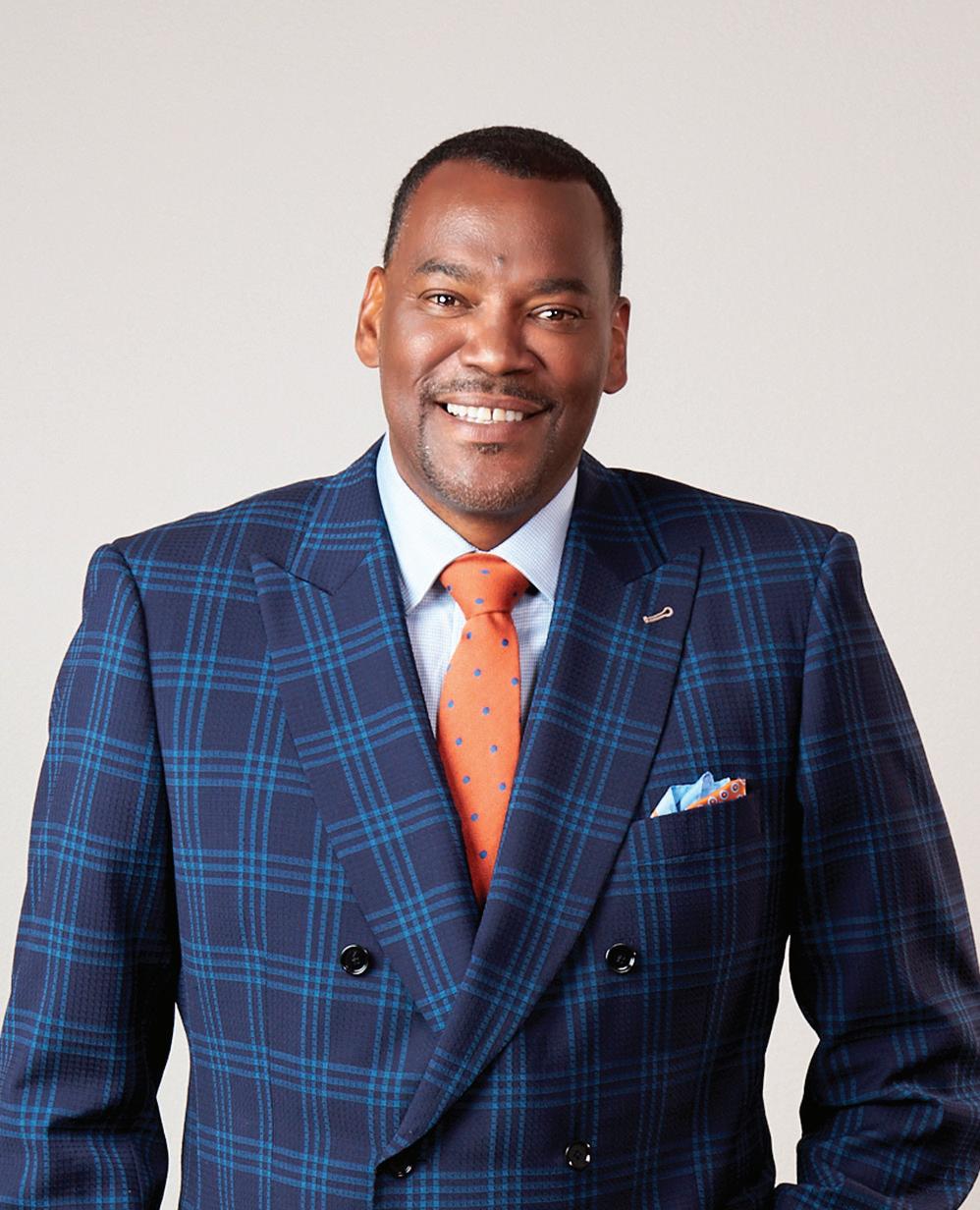
As the newly appointed Project Director of the Knowledge is Power (KIP) program, I am honored and excited to be a part of this transformative endeavor.
”
- Mateen A. Diop, PhD
and refining the program’s framework to set it up for success.
The goal for KIP is to recruit at least 500 high school students into the program, with a particular focus on English 1 and Algebra 1—subjects that pose significant challenges for many students. Shockingly, nearly 80% of Black males fail the English 1 STAAR test on their first attempt, significantly increasing their chances of dropping out of high school. Through KIP, the aim is to break this cycle by providing targeted tutoring and support to help the students thrive academically.
Working with churches was a new experience for me as
a career educator. While I had attended religious events in the past, including them in the education conversation was a novel concept. When church leaders were contacted to become involved in the program, they were enthusiastic about the opportunity. Some churches even declined funding and volunteered their assistance. I was inspired by their level of commitment and dedication to the mission of the KIP program.
One of the critical benefits that KIP students receive is personalized assistance with their studies. KIP’s approach is tailored to the individual needs of each student. The teachers and tutors are trained to analyze student data and provide targeted support specific to their areas of struggle. Additionally, experts in various fields are brought in who may not possess traditional teaching certifications but can offer valuable insights and guidance to our students. For example, a college professor specializing in math teaches at one of the sites. This flexibility allows KIP to provide diverse perspectives and experiences to enrich the learning environment.
Perhaps the most significant benefit the students experience through KIP is the caring and engaged learning environment. Unlike traditional classrooms, where discipline issues can sometimes hinder learning, KIP tutoring sessions are characterized by active student engagement. Teachers and tutors genuinely care about the success of each student and create a supportive atmosphere that encourages open dialogue and collaboration. This cheerful and nurturing environment allows students to thrive and grow academically. The ultimate goal is to break the cycle of underachievement and create a brighter future for each participant.
I believe in the power of belief itself. One of my favorite quotes from the Good Book is Mark 9:23, where Jesus declares, “All things are possible to him who believes.” This verse serves as a guiding principle in my life. It reminds me that despite challenges and setbacks, having unwavering belief in ourselves and our mission can lead to extraordinary outcomes.
For more information, visit: www.kipclc.org
For more information about Dr. Diop visit: www.drmateendiop.com
Instagram: @DrMateenDiop
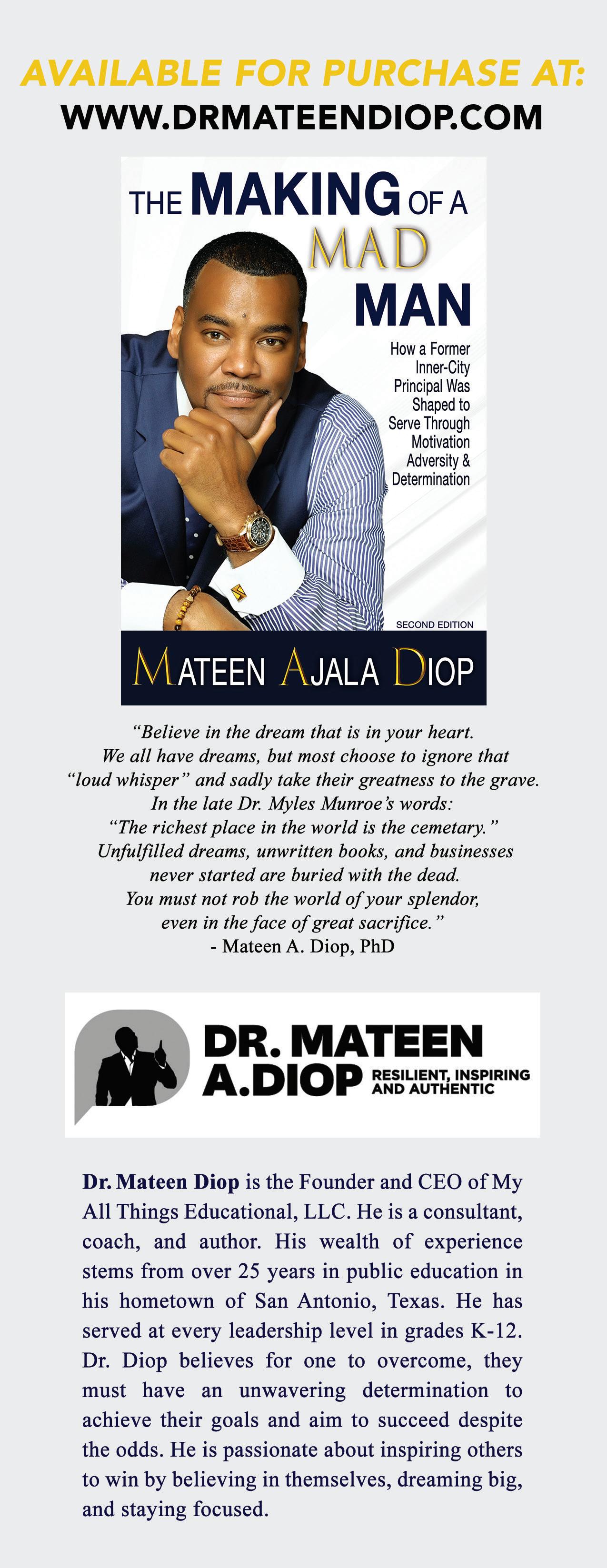
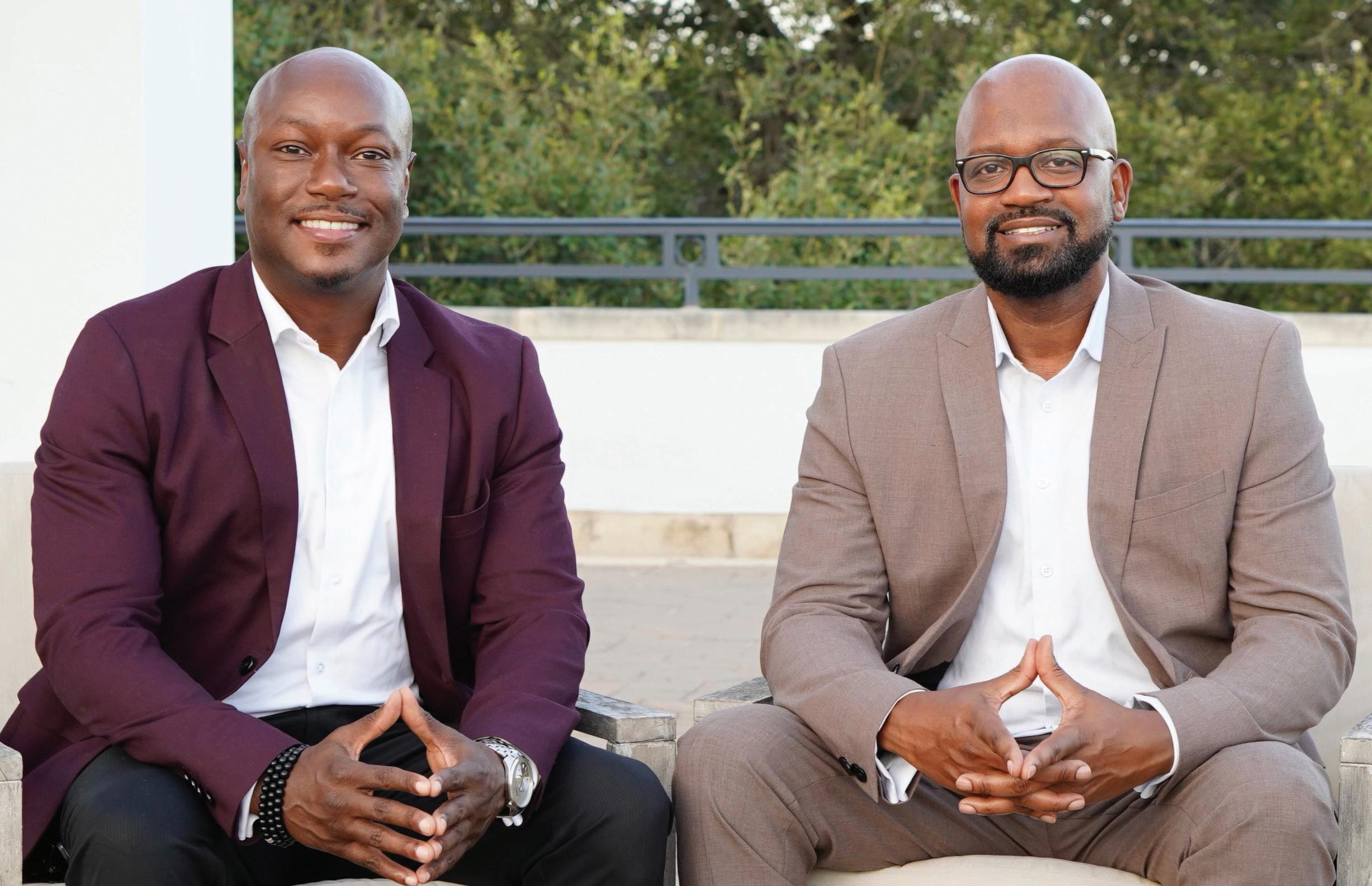
Leonard “Lem” Dixon
Michael Hicks
Owners, Roots Salad Kitchen and YOLO Pizza www.rootssaladkitchen.com
Chicago native, Michael Hicks, and West Virginia native, Leonard “Lem” Dixon, are best friends and business partners. In July of 2021, they opened the doors to their first restaurant, Roots Salad Kitchen. The hidden gem, located in the Blue Star District, offers healthy gourmet style eating options. In January of this year, a second Roots Salad Kitchen opened in the food court at the New Women and Children’s Hospital—an extension of University Health System in San Antonio’s Medical Center. Next to Roots in the Medical Center, is their latest venture, YOLO Slice, for pizza lovers.
While Lem handles the day-to-day operations, Michael works behind the scenes. As with any business venture, their journey hasn’t been without challenges. During the initial three to four months of operation, they both worked daily as they struggled to recruit sufficient staff due to difficulties posed by the COVID-19 pandemic. Lem and Michael know that obstacles are simply part of the process, that bumps and bruises along the way are inevitable; so they never let a setback deter them. Both are committed to growing the businesses and making
sure they are providing food that satisfies their customers.
DASH: Lem, what kind of work did you do before opening Roots, and what was your transition like going from the Air Force into the corporate world?
Lem: I entered corporate America after spending 22 years in the Air Force, and I actually hated it; it just wasn’t for me. I was in it for about 8 years, and I really wanted to do something for myself. I was working hard making the company all that money, and I knew I was smart enough to use my skills to work for myself.
DASH: Michael, is entrepreneurship something you always aspired towards?
Michael: I’ve always wanted to have something of my own, but I’ve been working in government for 27 years, so that’s been my priority. I was making my way up through government to become a director, and I did in 2017. That was kind of the pinnacle of what I wanted, so I moved to D.C. to take a director position. And in 2020, I came back to San Antonio as a director. I’ve traveled the world with this job, which was another goal of mine; I’ve been to 48 countries. After reaching my career goals and traveling, I started thinking that I wanted to do something for myself. I considered partnering with another friend to do some real estate
investing. Then Lem and I started talking about investing together, and the idea for Roots took off before the other one, so I devoted my time to it.
DASH: What are your thoughts on healthy eating patterns in Black communities?
Michael: I think it’s something we’ve overlooked too long. I’ve lost two family members due to poor eating—my mom and my sister. They were both overweight and unhealthy. There was no reason for them to leave this earth that soon. They were both amazing cooks. They ate three big meals a day, and it was usually unhealthy food. We suffer with diabetes, high cholesterol, high blood pressure, and a lot of other ailments because of our food choices. I think our communities need to be more health conscious.
DASH: What’s a hurdle you two had to overcome that was unexpected in the initial stages?
Lem: When we first opened up, we were getting some Google reviews and others coming in that were really bad. None of the reviews were about the food; they were about us. There was a lot of excitement when we had the grand opening, but we noticed that some of the locals who were willing to support initially stopped coming in when they found out the owners were Black. We noticed a reduction in support in the beginning, but we kind of anticipated that. As a matter of fact, when we first opened, we talked about how to overcome that racism. We had conversations about whether we should get someone else to manage it and be the face of the restaurant for it to be successful. It’s a shame that we even had that discussion.
DASH: Through all the growing pains, what was it that kept you both from saying “maybe this isn’t the business for us?”
Michael: Oh, we’re not quitters; we’re too competitive to quit. The only reason I would go into business with someone is if I know they have the determination to keep going. I knew that about Lem, and he knew that about me before we even started. When I start something, I’m going to finish it. Any task I begin, I’m going to see it through to completion.
DASH: A lot of people fail in business because they don’t have that determination.
Lem: Yeah, and I think sometimes you don’t expect something to be as hard as it is until you begin. You may have talked to another business owner who didn’t tell you about the hard times; most often, people only talk about the good times. If you look at someone’s success,


but you don’t know the trials and tribulations they went through to get there, you’ll think you want that, too. But you don’t want the journey; you don’t want to do the work. We already knew it was going to be hard in the beginning, so we were ready for the journey. We know that there are still going to be some tough times as we continue to expand.
DASH: Lem, how do you handle the day-to-day stress that comes along with the territory of operating three restaurants?
Lem: I don’t get stressed out too much; I don’t worry about anything I can’t control. If I can control it, then I do what’s necessary to handle it. If it’s something I can’t control, I try to mitigate whatever issues it causes. I’m not going to worry about it because I have no control over it.
DASH: Any business advice?
Michael: You have to believe. If you have a vision or goal, you have to believe in it. You have to trust the process, and do what it takes to get it. Just don’t take no for an answer.
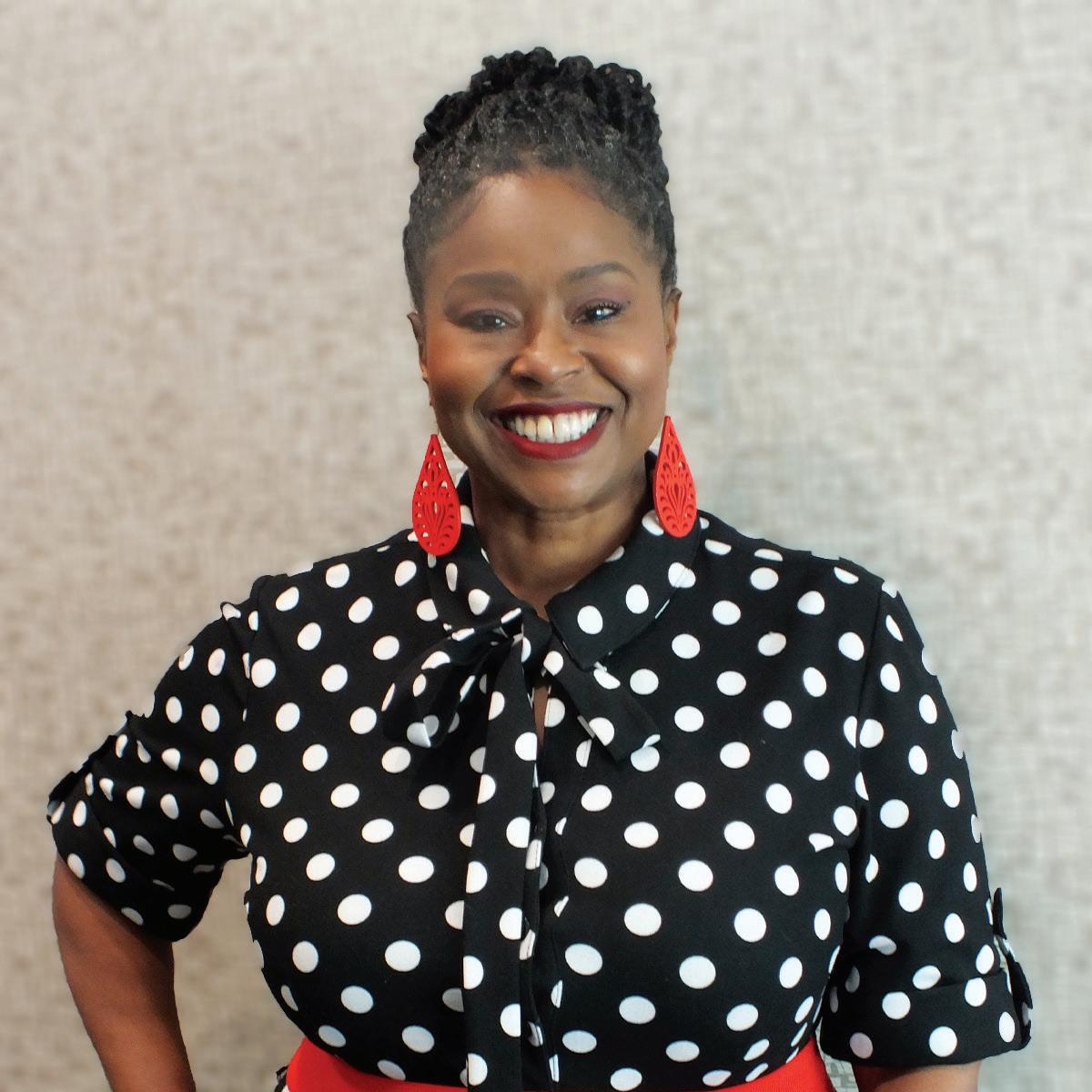
DEANNA BROWN
Founder/CEO, Forward Progress Arts and Entertainment Center www.fwdprogress.org
Program Director, Eastside Youth Content Creators Program (EYCCP)
What is the mission of EYCCP?
To create content and teach students on the east side, who are 10 to 18 years old, how to create film. If space is available, the program is opened up to students throughout the city of San Antonio.
What are your responsibilities as program director?
To recruit youth and facilitate the program. I have different instructors and guest speakers. I also facilitate the day-to-day operations.
What do they have to look forward to when the program ends?
There’s an annual event to showcase their films, and they can submit their work into film festivals. There’s no acting school or agency on the east side, so we provide the youth with opportunities to utilize their skillsets.
What is most fulfilling about working with the students in the program?
Connecting them with something they want to do and shooting them towards their dream. That is the most fulfilling thing to me—being able to create a platform for first timers. When people say, “I’ve always wanted to do that,” and being able to say, “You can do it!” I’m
inspired by being able to create an opportunity for them and to watch them grow and excel in their particular areas of interest.
How do the participants in EYCCP benefit from Forward Progress Arts and Entertainment?
The mission of Forward Progress Arts and Entertainment is to encourage creative dreamers to become authentic artists, and we do that by providing platforms for the students.
What theater work have you done in San Antonio?
I’ve produced and acted in several films in San Antonio. I’ve been able to produce two seasons of sitcoms. I was an art director on a few short films; and then after that, I auditioned for one of my friend’s films because I’m always on the crew. It was an amazing audition.
What do you want to accomplish that you haven’t already in arts and entertainment?
I want to be the Black mom on the Disney Channel. I love Tyler Perry. Working with him is in my future. And I want to be on stage at The Majestic Theater. I love acting.
What is a favorite quote that you live by?
A quote by Thomas Carlyle: “Go as far as you can see; when you get there, you’ll be able to see further.” Just keep making forward progress; you’ll get there. For example, I’ll take on an acting role and still get very nervous about memorizing lines. I have to talk to myself and remind myself that I really can do all things through Christ who strengthens me. And when there is an opportunity or a door that God opens for me, I’m walking through it. I have to put on my God-like confidence because in and of myself, I don’t have any.
How important is having a solid support system?
It’s extremely important. My husband is great. During production time, the whole house is in production mode. My daughters and my son are so supportive, and so is my mom. I truly appreciate them. My mother always said she just wanted to be a good wife and mother growing up. Then one day when we were filming, she told me that she always wanted to be an actress. So, I’ve been doing behind the scenes footage on my mom, and I’m going to finish it up and do a documentary about her illness and being able to come back to health. My mother encourages me; she’s the best actress I’ve ever known.
Instagram: @fwdprogressorg
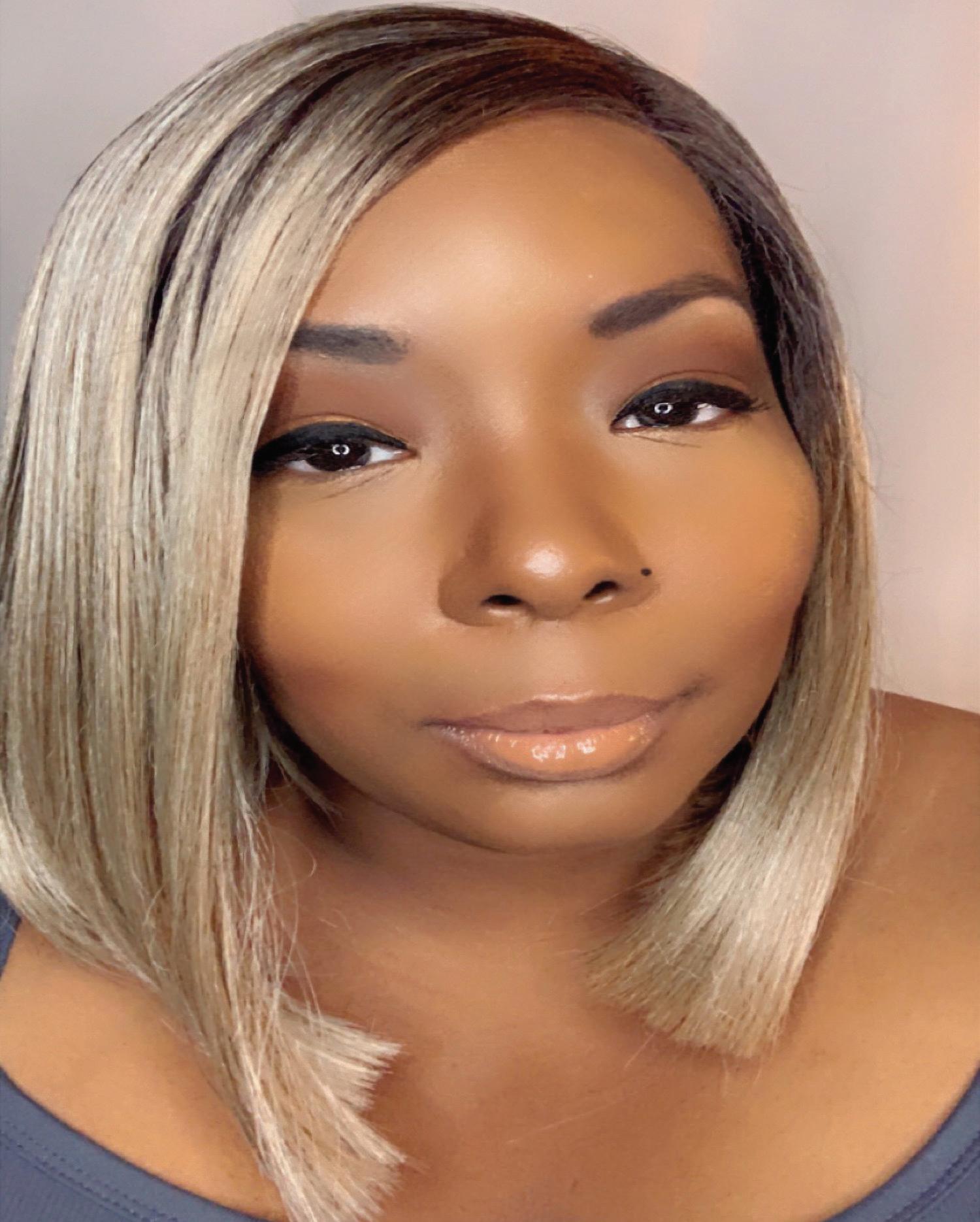
Singer, Dev Soul
Actor, Filmmaker, Writer, Art Noir Productions Owner, Soul Butter Bakery Company www.DevonMathews.com
At what age did you begin singing? Acting?
I began singing in the youth choir at Mt. Sinai Missionary Baptist Church at three years old. I began acting at seven years old at the Carver Community Cultural Center.
Who encouraged you to begin singing?
My desire for singing comes from my mother, Rebecca Cheatham Wilson, and my father, David Wilson. My mother was a part of the Walker-Ford Gospel Singers with my Aunt Reba. My Dad is also a singer and bass player who played for several groups and choirs as well.
What strengths do you possess that have helped you become successful at both singing and acting?
Tenacity, resilience, and crazy faith! When I realized that I was born to use my gifts to help evoke healing, positive change, and to minister to others about the love of Christ, it became personal.
What’s a dream venue you would like to perform at?
Madison Square Garden. I feel like that’s the “Mama, I made it!” performance venue of a lifetime!
Do you ever have performance anxiety?
Yes, every single time! My mind is always going in a thousand different directions.
How do you deal with it?
Prayer, hot tea, breathing exercises, and the start of the music helps make it dissipate. Once I’m locked into the performance, I’m locked in.
What’s the best advice you’ve been given?
To keep God first, trust the process, and my mother told me to always sign my own checks.
Who are your greatest supporters?
My mother by default because she gave up her life to create a path for me. Also, my Husband, Rev. James Mathews, who plays drums for me, loves me hard, deals with my meltdowns, and wipes my tears. Additionally, my dad is my hype man and is pushing me to the top!
You also have a film in the works, right?
My movie! My first movie is Ta’Mara and the King, a short film based on Genesis 38 in the Bible. This film is a modern re-imagining and my own personal interpretation of the story of Tamar and King Judah.
What type of singer do you classify yourself as?
Because I can sing almost any genre, I would say, Soul/ RnB/NeoSoul/Jazz/Gospel/Music/Theater/AfroBeats— if you get my drift. But a soul singer because I aim to touch the soul. Just don’t box me in.
Tell me about your debut single.
OMG! “Hot Coffee” is an experience! It’s a metaphor for the feeling you get when you drink a hot cup of coffee or something warm and soothing. This song is about love and the possibility of what could happen if you get out of your own way and open your heart. The main single is 100% written and vocally produced by me and 100% produced and arranged by Paul Cockfield, my musician for DevSoul for 17 years. Special thanks to Marcus Hyatt for blessing this single with his supernatural mix that helped elevate this from great to OMG! I’m so blessed to have made it to this point. I had to denounce the fear and self-doubt that prevented me from stepping out on faith for so long.
Instagram: @ mrsdevmathews
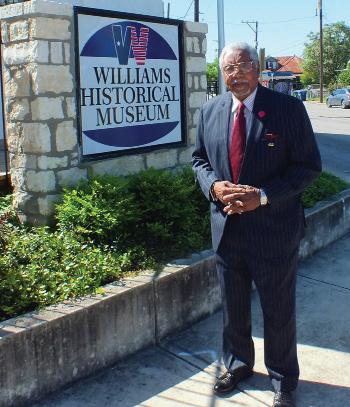
Owner, Williams Historical Museum www.williamshistoricalnationalmuseum.com
Charles Williams worked in a barber shop for the first time over 52 years ago; the shop was located on Commerce Street. He was one of the first to have a brand new shop in New Light Village, spending $36,000 for the first class barber shop. Williams ventured into property ownership and retailing haircare products before establishing Williams Barber College on W.W. White Rd. in 1993.
He is celebrated as a pioneer in East Side development. His substantial property holdings along Houston Street led to it being named Charles Williams Place. His most recent venture, Williams Historical Museum, commemorates the achievements and challenges of African Americans in San Antonio over the years.
Why did you want to open a museum on the East Side of San Antonio?
This was a 25-year dream. I started saving and putting it together because I promised Rev. Claude Black that I would do this; he and I talked about it. He said we needed to do something to preserve our history. I did this so people can at least learn about individuals who back 50 years ago were thinking about how to make things better for us. A lot of people don’t know the history of the East Side, but they should. We first
started the conversation when I had the Landmark Coffee Shop on the corner of Montana and Pine. Rev. Black told me about 35 years ago that if he had been a young man at the time, he would have started buying up properties because he believed the East Side was going to grow. I thought about that, and 18 years ago, I bought the Landmark and developed it; it was a lovely house. I’ve been into nice, older houses. I knew this area was going to develop, and I just didn’t want it to happen without having some Black people participating in the process.
What are your thoughts on gentrification on the East Side?
People have talked to me about gentrification. To me, it’s not gentrification; it’s lack of preparation. For example, a person should know that if you don’t pay your grandmother’s taxes, they are going to take the house. Depending on how many children and grandchildren there are, find out how much the taxes are and each person who can should pay a portion to keep their grandma’s house. So many don’t have that kind of vision. Instead, they buy expensive cars and things and don’t educate themselves or pay attention to the ways they can build generational wealth. We don’t hand down wealth because we lose sight of the ball—we don’t keep it moving. They showed the story this morning on television of Black Wall Street in Tulsa, Oklahoma. The town was burned down, and it’s been a struggle for Black folks to get back to that point. We don’t pull our resources together.
Why do you think that is?
Well, it began with the situation right after slavery. There was a fellow by the name of Willie Lynch. He talked about separating the light-skinned Blacks from the dark-skinned Blacks, the educated from the uneducated, field hands against the house servants, and all that. We still haven’t come out from under that mentality.
Tell me a little about your upbringing.
My hats off to Black women. The lady I called “mama” was really my dad’s older sister. I never knew my biological mother; she died when I was two, and my father was killed when I was five. We stayed with my granddad for a little while, and then my aunt decided to raise me and my brother. I thank God for her; she was the only mother I knew. About 90 years ago, she owned two houses, and that was awesome back then for a Black person. She did positive things that influenced me.
What is something specific you learned from her?
She used to be hard on me about the selection of my friends. When I was about 16, I thought she perceived herself as better than other people. And as I got older, I realized she knew exactly what she was talking about. There was a friend that I liked hanging out with, and she told me not to hang out with that boy, that he was going to get me into trouble. I wondered what she had against him. Then six months after we had that conversation about him, he and another boy wrote some hot checks on a gentleman’s account and signed my name to one of them. So, she was absolutely right about him. She taught me many life lessons.
Where did you get your entrepreneurial spirit from?
My mother had an entrepreneurial spirit; maybe she got it from being around the white people she worked for. My granddaddy was a farmer, and he had a business mindset, also. There was a situation called third and fourth farmer, which meant that the white man owned the land, you worked the land, and you would get a fourth of it. My granddaddy flipped the script. He took the third and the white man got the fourth. He was working the land like he owned it. My granddad had his own mules, his own plows, his own stuff, and he was a tough task master. We didn’t get a chance to just play in the summer; there was always something to do on his farm—feed the cows, chicken, horses, and gather up wood. All of that was building entrepreneurial character into me without me even realizing it.
The Williams Historical Museum is a dream come true for you. How does that make you feel?
I’m grateful to have the opportunity to educate people about the history of the East Side, especially Black History on the East Side. There are so many Black people who are featured in the museum who made a tremendous impact not just on the East Side but throughout the city. For example, Dorothy Collins. People usually just associate her with the San Antonio Chapter of the NAACP, but she was the first Black principal of a non-Black school, and she was the first-grade teacher of the singer Gloria Estefan. Another individual I’ve had a great deal of admiration for was Walter Rogers. He was the lead man with the company that was training him to do concrete work. Rogers went to his boss and talked to him about being the foreman of the company. He was told he would never be the foreman in that company, so he quit and formed his own company. He taught others how to do concrete work. But the important thing is that he wouldn’t let the white man crush him by telling him he couldn’t be a foreman at his company because he was Black, and that im-

How can the community get involved and support the museum, and what services do you offer?
Schools can bring their students here on field trips so they can know about Black history in San Antonio. We have a conference room available to rent for meetings, and we also rent the museum for events.
I’m grateful for the opportunity to educate people about the history of the East Side. “ ”

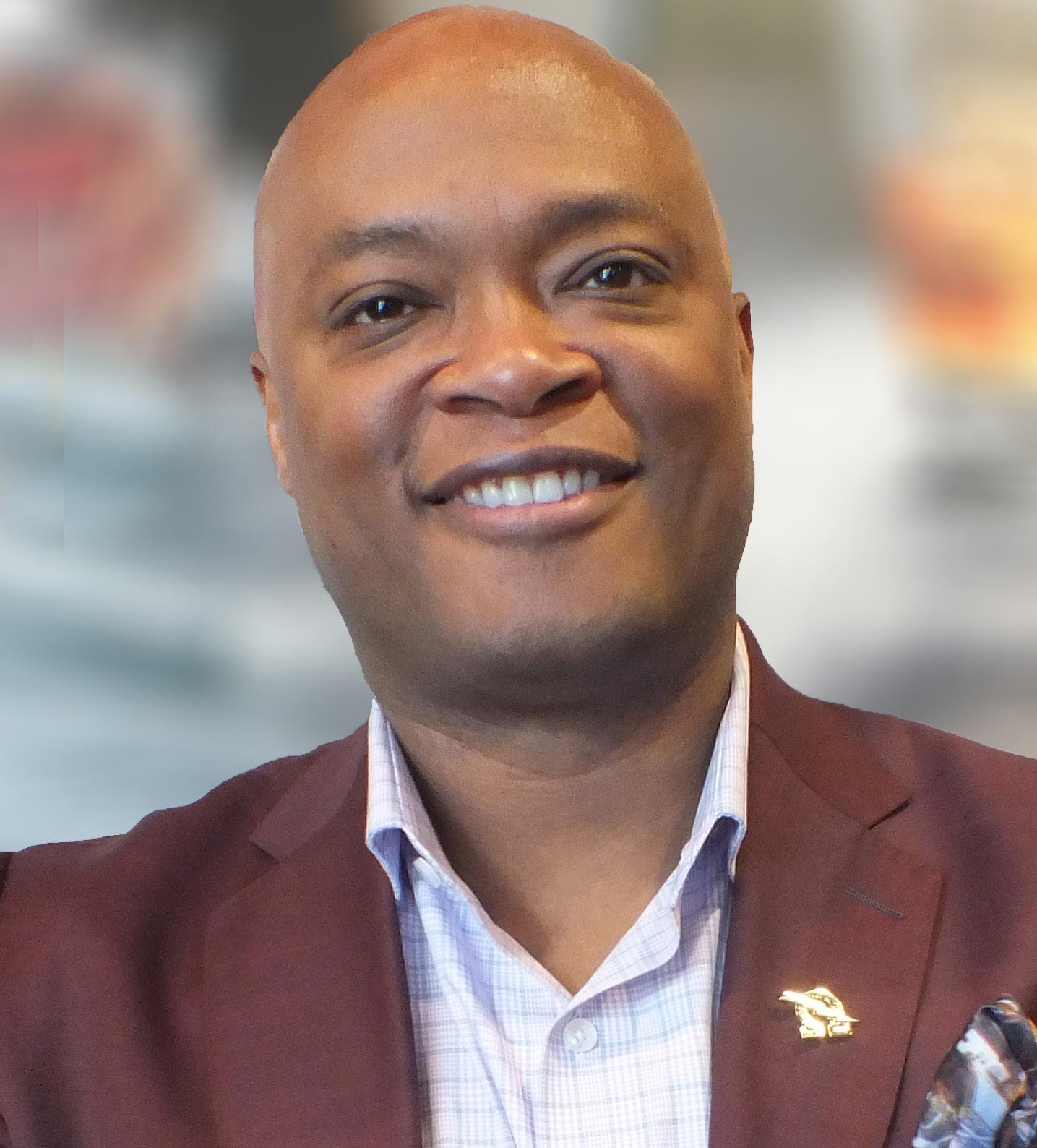
Owner/CEO Four9 Cigar Lounge www.four9cigars.com
When you were young, did you aspire to one day become an entrepreneur?
Well, I grew up in Marrero, Louisiana—the West Bank of New Orleans. Restaurants were common. We had the t-shirt guy, the dry cleaners, and other establishments, but I never saw myself as an entrepreneur. Back then I never felt like it was something I wanted to do.
How many years have you been in the cigar business? Almost 3 years. We launched Four9 in 2021.
Tell me about the name.
My business partner and Chief Operating Officer, EB, and I were both stationed in Hawaii. He was in the Marine Corps. I was in the Army. We were smoking cigars and discussing how many countries we had visited, and it came to 49. And then a couple of weeks later, we were trying to find a name for the cigar lounge, and a gentleman asked me how many years I had served, and it was 28 years. Then he asked EB, and it was 21. And that’s forty-nine. Forty-nine wouldn’t stick, so we went with Four9.
It’s a unique name. Now tell me about the American Gangster theme. I really like the artwork. Thank you. My cousin is an interior decorator. I called
and told her what my vision was. She said she would bring it to life, and she did. I was surprised when I saw how she put it together, and I love it.
What led you to open a cigar lounge?
It was a dream. I laugh every time I start to tell this story because it’s cliché-ish. I was retiring, had multiple job offers and opportunities to do other things. One weekend I had a dream that I had a cigar lounge, and it was so clear to me; everything was clear. Even what you see now was the theme of that dream. I tried to talk myself out of it several times; I didn’t want to do it.” I’d never owned a cigar; I’d never been in the cigar business. Then one day, I did research about cigars all day, and it turned into all weekend. I’d step away from it, then something would draw me back to it. Then I had a conversation with EB about it, and we went from there.
What was a challenge you faced when getting started? Everything was a challenge—moving to a new city. I knew people here; I have friends here. But on the business side, I had to figure out everything on my own. I was here almost a year before EB got here. Looking for a location was difficult. I spent countless hours researching laws and permits and things like that. So, everything was a challenge, but I wouldn’t change it.
What kept you going?
The dream. Every time I wanted to step away from it, something would come up, and I would start researching again. So, I think it was just destiny. As much as I didn’t want to do it at times, there would be odd things that pulled me back to it.
Did you smoke cigars at the time?
I had started, but not much. I hated smoke growing up. But then being in the military for 28 years, you know, deployments and things like that, we would smoke cigars; but I wasn’t a serious cigar smoker. A gentleman in Hawaii told me I couldn’t be in the cigar business if I didn’t smoke cigars, and I believed him. By that time, I was already smoking more cigars. Then I started to learn more about cigars and really dive into it. I went from being a casual smoker to a very deliberate smoker.
What traits do you possess that have attributed to your success in business?
I attribute my success to my military career. I remember referencing my mom often when I was in the military because a lot of things that helped me be successful in
the military were things she taught me. She taught me how to take care of myself. I learned how to cook, do my laundry, and other life skills. She would remind me that she’s not always going to be here. Also, my uncle would remind me to always know what’s going on around me, and remembering that has been helpful throughout my life.
What is a key component that leads to success in business?
Discipline is a key thing. If you’re not disciplined at anything you do, you can’t expect to be great at it. Look at people as a premium. Invest in people, then you get a return from them. Whether it’s your employees or your patrons—whomever. I don’t believe in transactional relationships, that’s why I wanted to have a small cigar lounge, an intimate setting so we can get to know the patrons, and they can get to know us. We want to talk to people; we want to get to know them and build relationships.
What are your core values as it relates to running your business?
I talk to the team about three things quite often— people, property, and professionalism. That’s what I utilized in the military. People, as I mentioned, are a premium asset. You can’t do anything without people. Property is your product, your facilities—everything involving your business. Professionalism extends beyond the consumer relationship. It’s also how you treat your teammates. If you’re late to work, then your teammate has to cover for you. People, property, and professionalism are the core things I look at. At Four9, we’re consistent about what we provide on a daily basis. We’re disciplined. You can have any kind of formula you want, but if you don’t have discipline along with it, you’re not doing it right.
How do you keep a positive perspective as an entrepreneur when things don’t go as planned? When you don’t get what you want, what you get is experience. I wanted mentorship in the cigar business. I reached out to some people, and they didn’t give it to me, but I was okay with it because I got experience. It caused me to study more, research more, and learn every detail of the business. I had to figure it out on my own.
How did you handle roadblocks when launching your business?
I never really got down or deterred by the roadblocks or any kind of adversity; I just found the best ways to deal with whatever the issues were.
In one word, how would you like the cigar lounge to be described?
Amazing. From the time you walk in the door, the vibe is just different from any other place you’re going to go into; it’s cozy by design. Everybody is a VIP here, so we will never have a VIP area no matter how much we grow.



Owner, Kai Simone Winery www.kaisimonewinery.com
What was your path toward entrepreneurship like?
I retired from my position as a behavioral health officer for the US Army in 2016. My husband and I started working on the business right after my retirement.
Was it always in your plans to launch a business after you retired?
I knew I was going to become an entrepreneur. I didn’t know I was going to open a winery.
How did opening the winery come about?
Well, opportunity. I was in army medicine, and my husband is in army medicine. As we would come in and out of San Antonio, we were always seeing things about breweries, distilleries, and wineries. I did really basic research, and I learned that there aren’t a lot of minorities in the business, and I decided to look more into it. So, as we started to look at it a little further, I realized I could shape my own business plan, and that’s how it started.
How do your daughters feel about you naming the winery after them?
I don’t get that they’re so excited about it. I always wanted my own business to be a model for my kids— to show them that they can do it. I would love for them to keep the winery, but this is my dream, not theirs. So, if they decide not to keep it, their commitment to me
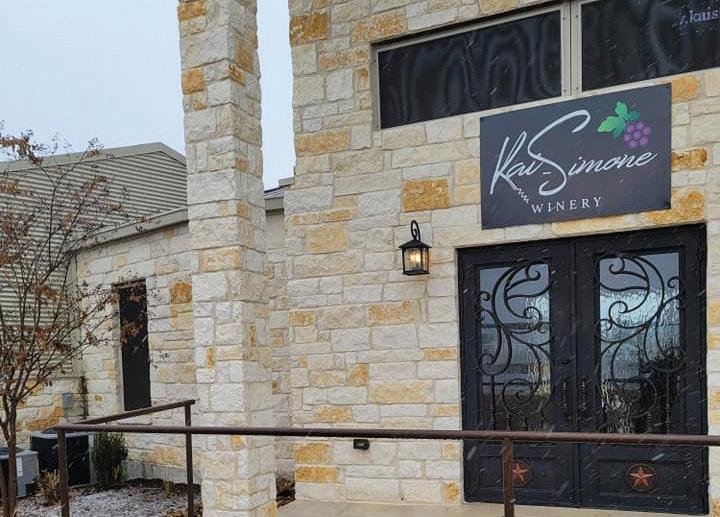

is to start their own businesses, whatever that may be.
Are you a wine connoisseur?
I would be lying if I said I have a love for wine because, honestly, I was never a drinker or a smoker. I’ve never been a person that dealt in a lot of vices. I was looking at the winery strictly as a business opportunity. I have a couple of friends who are connoisseurs; and being with them, I learned that I liked pairing wine with food.
Did you seek advice from other winery owners to gain information prior to jumping into the business?
I did; I spoke with a lot of winery owners and managers. I asked them simple, poignant questions like what they wish they had done differently; if they were glad they got into the business; or if they felt it was a mistake. I just asked really basic questions. Most of the people really like it and love that they can shape their own business model the way they want to.
What’s the best business advice you’ve received?
“Don’t worry about what other people are doing or what they think about what you’re doing.” If this is what you want, go and get it. My husband and children were the only ones who knew I was going to open a winery. My other family members didn’t find out until I was getting ready to build. Build in silence.
What is a strength you possess that has contributed to your entrepreneurial success?
I’m a very driven person. I’m very strong, and I’m a quick study. I’m a self-learner, and I prefer it that way. So, if you’re my consultant, I don’t prefer that you hold my hand. I’ll call or send an email if I need you. Also, I’m dedicated and committed to what I want to do.
Instagram: @kaisimonewinery
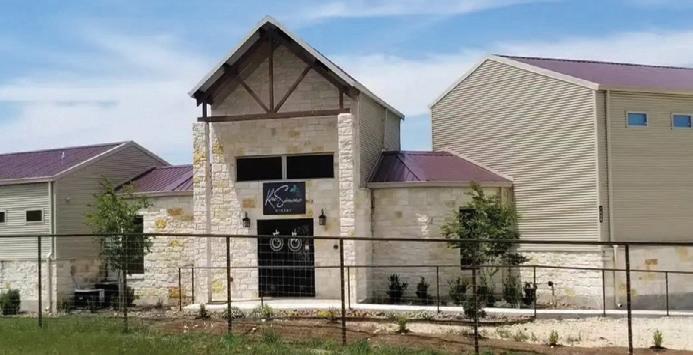


GARLAN McPHERSON
Mrs. Kitchen Soul Food Restaurant www.MrsKitchenSoulFoodRestaurant.com
Who is Mrs. Kitchen?
Mrs. Kitchen is my grandmother. I spent a lot of time with my grandmother growing up—watching her cook when I would go visit her. I learned how to cook from years and years of watching her.
Sounds like your grandmother was very influential in your life.
Yes, very. She showed me unconditional love. The first gift my grandmother gave me was a Bible. She said, “You stand on this, and you can stand on anything for the rest of your life.”
Why did you decide to open a restaurant?
After being in law enforcement for about 18 years, I asked the Lord what I should do, and I was led into the restaurant business. I really didn’t want to at first because everybody knows that the restaurant business is hard work, but I just walked through the doors that God opened for me.
Did you get a lot of support in the beginning?
I did get support, but there were some people who told me I wouldn’t make it, especially since I opened on the east side. I didn’t let that deter me. I believe you can achieve all things that you believe you can achieve. When you have a firm foundation, you can ask
And you have to believe in your vision. If you don’t believe, nobody else will believe. “ ”
the Lord for anything. Whatever I put my hands to, God is going to touch it. I have faith in Him.
What does “Chef LA” stand for?
It stands for cooking with “love always.” My grandmother taught me that anytime I’m preparing for family or anyone else, to always cook with love. And that’s exactly what she did; she always cooked with love.
What is something you learned throughout the process of becoming a business owner?
It’s not just what you know, but who you know. It only takes one person to have your back—that one connection that’s going to give you what you need to help you get to the next level.
What makes you excited to come to work?
It’s the people. We’ve fed millions and millions of people. It’s a great feeling when people smile at me and say, “Man, your food is awesome.” We put love in what we do, and it feels good to get that love back from our customers.
How do you maintain a positive work environment?
Employees respect you when you set a positive example. You can’t get people to follow you if you’re a dictator who doesn’t show respect. Employees need to know that their leader genuinely cares about them.
What is your advice to someone who wants to launch a business but they lack funding?
You have to plan it out; plan everything out—how you’re going to go about it. Seek out people who will help you. Knock on doors. Ask people how they accomplished what you are trying accomplish. Somebody is going to help you. And you have to believe in your vision. If you don’t believe, nobody else will believe.
Instagram: @mrskitchensa

